TIDINGS
Winter 2023

Winter 2023
Editor Elizabeth Grant
Design Co. & Co. www.coandco.ca
Postal Address Tidings
c/o Advancement Office
University of King’s College
6350 Coburg Road
Halifax, N.S., B3H 2A1 (902) 422-1271
King’s website www.ukings.ca
Email kimberly.gosse@ukings.ca
10
The new vision for music at King’s Neil Cockburn joined King’s as Director of Chapel Music in the fall from Calgary. He shares why it’s important for him that choristers and chorus members enjoy a learning experience that goes beyond singing and discusses ways to develop the chapel choir’s repertoire.
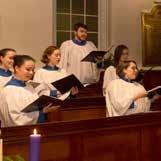
Stories for this issue were written by students, staff, faculty and alumni of the University of King’s College. The magazine was copyedited by Elizabeth Foster, BJ(Hons)’22.
Tidings is produced on behalf of the University of King’s College Alumni Association. The views expressed in Tidings are expressly those of the individual contributors or sources. We welcome and encourage your feedback on each issue.
Mailed under the Publication Mail Sales Agreement #40062749
FYP logo designed by Ray Fenwick rayfenwick.ca
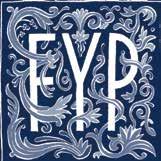
50
When Bonny Reichert, MFA’22, was thinking of writing a book, she called her former Chatelaine colleague, MFA Cohort Director Kim Pittaway. Reichert knew she “had a story right at my fingertips,” but felt trepidation writing about herself. Pittaway offered the nudge she needed.
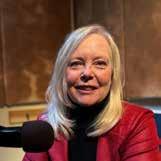
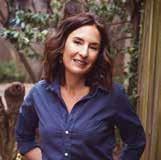
22
‘Audio is the most visual medium’ Assistant Professor Pauline Dakin, MFA’15, recently worked with CBC to adapt her bestselling memoir into a podcast—a medium she says she “loves” and one she teaches in her Intro to Podcasting course. Read where she and other faculty say podcasting gets its power and why it’s not just for journalists.
32
To ‘wander imaginatively’ fifty years hence: exploring the future of FYP As the Foundation Year Program celebrates its fiftieth anniversary, we sat down with four members of faculty, including three program alumni, to find out what challenges and opportunities they see on the horizon—and what advice they would offer the FYP class of 2073.
6 Campus News
37 FYP Texts
52
As a junior UN employee in South Sudan, Paul Atanya’s, BA’93, boss encouraged him to study in Canada. When Atanya said he wanted to study in a small city by the sea, his boss brought up King’s. Thirty years later, Atanya is a successful career advisor to immigrants in Calgary, Alta., and fundraised to build a school in South Sudan.
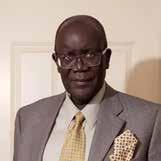
68
The transformation of Alexandra Hall
Renovations undertaken over the spring and summer of 2022 transformed Alexandra Hall into King’s first accessible residence. This visual essay reveals how contractors stripped the stairwell down to the brick to introduce the new elevator and includes new photography of the impressive results.
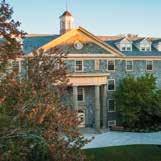
AS RESIDENCE STUDENTS past and present can attest, the opportunity to live “on the Quad” brings with it many privileges and insights. Dean of Students Katie Merwin, BA(Hons)’11, refers to “Quad time”: the way it takes longer to go from one place to another across the Quad, than the same distance anywhere else. It’s the happy result of the many familiar faces you encounter and the conversations that follow. I particularly enjoy the seasonal rhythms that living and working on the Quad bring into focus, like the fall emergence of brilliant gold in the leaves of the gingko tree by the Arts and Administration Building, or the magnificent spring transformation of the magnolia tree in front of Alexandra Hall. Through the seasons, the rhythms of campus life play out, like the progress of Foundation Year Program students from sections one to six and through the ages, and our annual journey from Matriculation and the first Formal Meal, to Encaenia and the quiet of summer.
At the time of writing, I feel energized by another rhythm at King’s—a pattern of renewed, expanded and new connections.

In the summer of 2022, we announced that the journalism and MFA programs have united to create the School of Journalism, Writing & Publishing. With added momentum from the new MFA in Fiction, our essential place in media and publishing sectors, both regionally and nationally, is being revitalized and expanded.
The ongoing celebrations for the fiftieth anniversary of the Foundation Year Program (FYP) (pgs. 32-38) include a host of opportunities for FYP alumni to reconnect with friends and faculty. I hope you will consider joining us on campus in June for the return of Alumni Day, which is teaming up with the Fifty Years of FYP celebrations to offer a full weekend’s-worth of events (pg. 2). After the extended separations of recent years, it will be delightful to welcome alumni back to campus to reconnect with each other and with King’s.
This year King’s and Dalhousie will come together to celebrate the one-hundredth anniversary of our two universities’ association on September 1, 1923. Though it has evolved and changed in the decades since, this association remains unique in Canada. Generations of students have benefitted from the complementary strengths of King’s and Dalhousie and the exceptional education we provide, offering the best of both worlds. As we celebrate and reaffirm our connection, I am confident our association will lead to new opportunities for students and the broader communities we belong to.
One such opportunity is the October 2023 conference of the Universities Studying Slavery (USS) Consortium, a multi-institutional network that researches historical and contemporary issues dealing with race and inequality in higher education and university communities. Through this conference (pg. 4), co-hosted with Dalhousie and the Black Cultural Centre for Nova Scotia, it is my hope that we will create new and stronger connections with the African Nova Scotian community, and with other universities engaged in this work.
We are building new connections with communities historically underrepresented at King’s. With its new entrance and elevator, Alexandra Hall now has accessible rooms, with more to come. To guide our efforts in integrating accessibility into everything we do, we have welcomed King’s first full-time Accessibility Officer, Michelle Mahoney (pg. 30).
The development of the university’s cohort initiative for Mi'kmaw students who
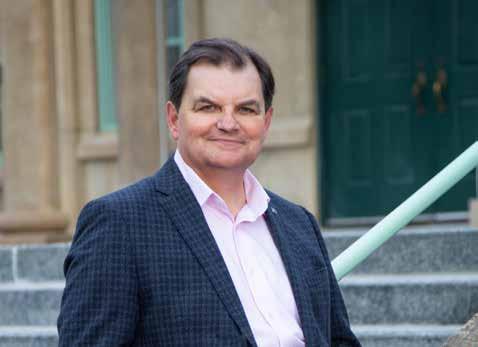
wish to study journalism (pg. 14) is being guided by the recently established Mi'kmaw and Indigenous Advisory Circle. The circle will also advise on broader efforts to welcome all Indigenous students, faculty and staff. To advance this work we have, with Mount Saint Vincent University, hired Emily Pictou-Roberts, BA(Hons)’20, Atlantic Canada’s first Auntie-in-Residence (pg. 14), to support the Indigenous members, especially students, of both universities.
Through our experiential learning initiatives, we’re making new and exciting connections in sectors such as innovation in technology and healthcare (pg. 7). King’s students and alumni bring dynamic thinking, insight, creativity and empathy to everything they do. It is gratifying to see our students demonstrate what we know to be true, that the education King's offers in the liberal arts and journalism prepares students for anything and everything.
At the heart of our community lies our connection to one another and our hope for making the world a better place. The bonds we carry and those we build within and beyond our Quad, are invaluable as we work toward a stronger future for the university we love.
Sincerely,
Mark your calendars! From June 2–4, 2023, Alumni Day joins Fifty Years of FYP for festivities that will last all weekend! The recipients of the 2023 Alumni Awards will be announced and celebrated, alongside 2020 winners who we were unable to award in person due to the pandemic. Catch up with friends old and new and reserve your room in residence to spend a full weekend back on the Quad!
HIGHLIGHTS INCLUDE:
• Kick-off Friday evening in the Wardroom
• Alumni brunch
• A special Foundation Year Program lecture to be delivered by an alum Register to attend, book a room in residence and join the party! Visit: ukings.ca/alumniday

The University of King’s College and Dalhousie University, together and in partnership with the Black Cultural Centre for Nova Scotia will host the 2023 Universities Studying Slavery Conference.
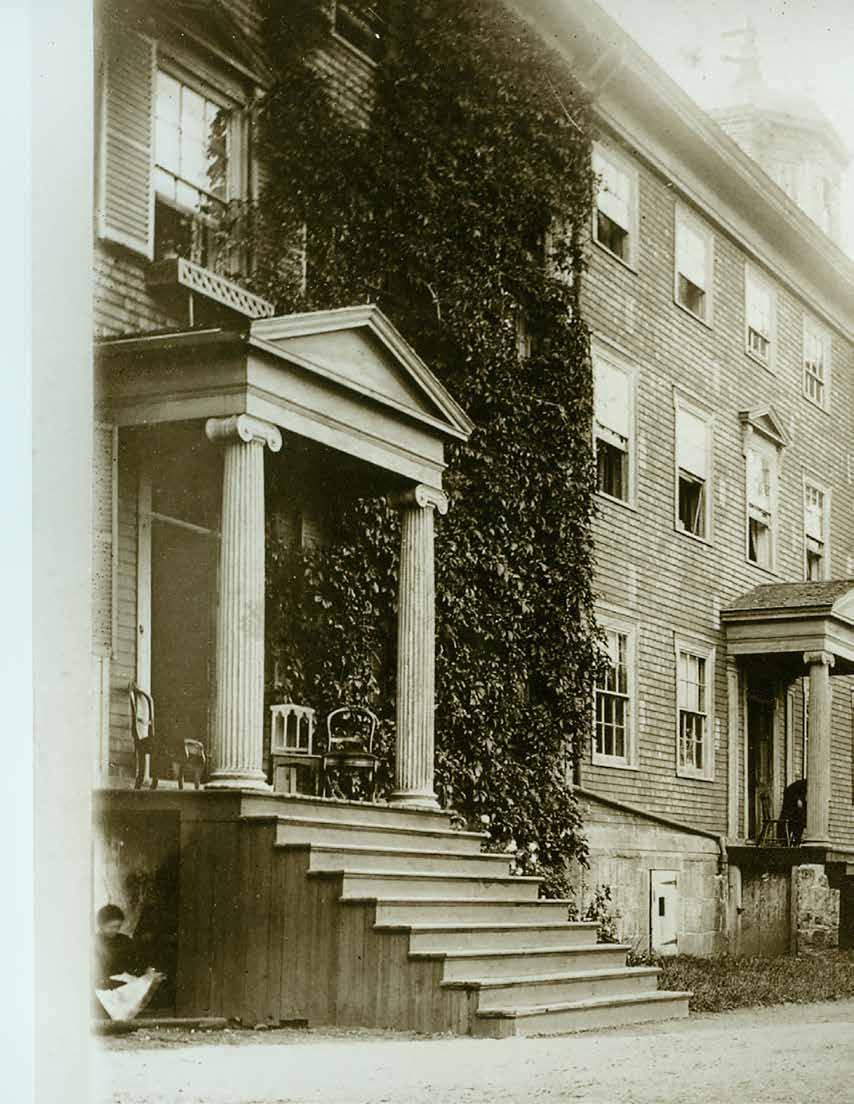
In October of 2023 King’s and Dalhousie, in partnership with the Black Cultural Centre for Nova Scotia will host the first conference of the Universities Studying Slavery (USS) consortium to be held outside the United States. The conference will feature keynotes by seven leaders from the spheres of politics, the arts and academia—each an internationally renowned voice on slavery and reparations. Scheduled to take place in Halifax, N.S., from Oct. 18–21, the conference will explore the theme ‘Slavery, Reparations and Education: African Nova Scotia, Canada and Beyond.’
Based out of the University of Virginia and comprising more than 60 universities, USS is dedicated to organizing multi-institutional collaboration on research into historical and contemporary issues dealing with race and inequality in higher education and university communities. Dalhousie was the first Canadian university to join this groundbreaking research, followed shortly thereafter by King’s.
Interested participants are invited to submit proposals for papers and for panels. Panels can be disciplinary, multi-disciplinary or consist of academics and non-academics and the conference is open to the public.
View the Call for Papers, learn more and register for conference updates. ussconference.ca
Timothy Leary, a problematic figure in psychedelic history, became a well-known spokesperson for psychedelics—Richard Nixon is alleged to have called him the most dangerous man in America for promoting psychedelic use. As psychedelics were marginalized in much of western society, the reliable documentation of their use and effects reduced.
Dyck says that with the advent of amateur chemists creating and synthesizing acid onto paper sheets (blotter paper), the history of psychedelics became even more difficult to document and ultimately trace.
analyzing Indigenous and countercultural ways of using psychedelics and the policies and ethics that have limited, prohibited or otherwise stymied their use.
Complicating matters further, the use of double-blind trials to study the effects of psychedelics goes against Indigenous ways of using psychedelics—often in a sweat lodge or as part of other ceremonial purposes. This raises questions about the ethics and purpose of psychedelic research.
But Dyck says that promising research is out there. She points to research conducted by Alcoholics Anonymous (AA) that compared the use of AA versus the use of AA coupled with psychedelic usage. The study found that AA had a 40 per cent success rate in stopping alcoholism, whereas it jumped to 60–90 per cent when coupled with psychedelic use.
PSYCHEDELICS WERE the talk of King’s on November 17, but not for the reasons you might imagine. Dr. Erika Dyck, Canadian Research Chair in the History of Medicine at the University of Saskatchewan, presented the 2022 MacLennan Lecture on the resurgence of psychedelics in pharmaceutical use.
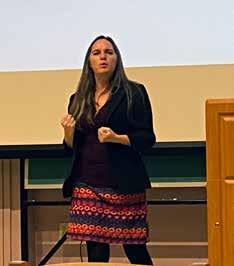
Dyck is at the forefront of the discussion about the ethics and policies of psychedelics, from their earliest histories to today. Her work focuses on bringing the underground history of psychedelics into the mainstream,
Dyck pushes back against the notion that psychedelics are undergoing a “renaissance,” instead questioning what exactly is being reborn. For Dyck, the use of psychedelics has been constant, if illegal, for nearly a century, and Indigenous practices involving psychedelics go back millennia. In Mexico alone, there are over 200 plants that are psychedelic, and in the Dark-to-Middle Ages there are tales of St. Anthony’s fire (or ergotism) producing psychedelic-like symptoms. It was only in 1938, however, that ergot was synthesized into LSD, with several other varieties of psychedelics being synthesized and distributed in the decades prior and after.
The use of psychedelics today, says Dyck, is now being considered for the treatment of many different psychological disorders, including major depression, PTSD and anxiety, with clinical trials now being created in order to test its efficacy. However, psychedelic use remains stigmatized, with public health campaigns in the late twentieth century (the most prominent of which was Richard Nixon’s) that suggested acid is the most dangerous drug, leaving many opposed to its medicinal use.
Health Canada is cautiously exploring psychedelic use to manage end-of-life anxiety in some circumstances. Clinics are beginning to open up across Canada offering psychedelics for therapeutic use and some states and provinces across North America are beginning the process to decriminalize psychedelics.
On the other hand, Dyck warns against viewing psychedelics as a cure-all, especially in (what is often) a laboratory setting. Instead, she argues that we should be asking questions like whether the psychedelic resurgence is an opportunity to reconcile Indigenous and Western knowledge systems, especially when it comes to plants, healing and spirituality. She asks if stories matter for engendering a certain trust and authority in science. Taking the idea further, she asks if we need “a psychedelic humanities.”
Founded in 2017 through a donation from Oriel MacLennan, the MacLennan Lecture takes place as part of a visiting scholar program hosted by the History of Science and Technology program.
As the Books by Heart app launched its beta test on campus, cardiologist Dr. Gabrielle Horne sat down with philosopher and Director of FYP Dr. Daniel Brandes to discuss the transformative potential of book culture on hospital wards
by Elizabeth Foster, BJ(Hons)’22An ambitious experiential learning project aims to address this question head-on. Books by Heart (BBH) is a collaboration between the University of King’s College, Nova Scotia Health and the Atlantic Publishers Marketing Association. The goal is to provide free local literature to acute care wards in hospitals by way of a smartphone app stocked with ebooks and audiobooks. By making the app freely available to the patients, healthcare staff, doctors and nurses on these wards, they hope to foster a “book culture” and create opportunities for connection and dialogue among those spending time there.
Where does King’s come in? The first step of this innovative project is a beta testing phase for the Books by Heart app. It launched on campus in the fall of 2022, giving students, faculty, staff and alumni access to the app and its reading material.
On a late-November evening in the KTS Lecture Hall, Joanna Sheridan, BA(Hons)’07, introduced the study. As the university’s Coordinator of Experiential Learning, Sheridan leads the project on
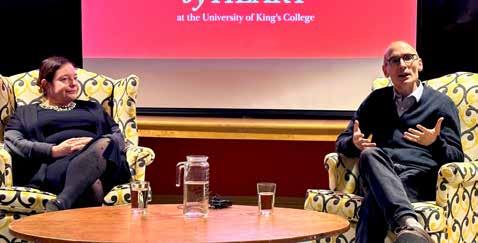
campus along with the student team of seven overseeing the test phase. Sheridan said Books by Heart is suited to the kind of education King’s offers. “A liberal arts education is a broad enabling force behind an individual, and so King’s work-integrated learning initiatives are deliberately border-crossing.
“Books by Heart is emblematic of that spirit,” she continued. “Health innovation and healthcare research employ many people beyond medical personnel. By partnering on a large project like this, we carve out a space for our students to build work experience, professional networks and context in a non-traditional field for arts graduates.”
Co-presidents of the Books by Heart student team, fifth-year student Bronwyn Turnquist and third-year Laura Gilron introduced the key speakers for the evening: cardiologist Gabrielle Horne, MFA’19, and Director of the Foundation Year Program Dr. Daniel Brandes, ’90. Horne has been instrumental in the development of the project and spoke from her perspective as a health care provider, while Brandes addressed the philosophical power of reading. Each wrestled with the
bigger questions surrounding the project. Namely: how much can a shared experience of a book really help?
Central to the project’s philosophy is the idea that books help us grapple with difficult situations. One school of thought argues that books help people come to terms with their mortality, exploring the “big” questions about life and its inevitable end. The other frames reading as a way to escape real-world troubles, however briefly.
Brandes pointed to Leo Tolstoy’s novella The Death of Ivan Ilyich in which the titular character, upper-class Ivan Ilyich, grapples with a terminal illness. Ultimately, the novella explores the importance of human touch and connection at a crucial point in one’s life.
“I find that book very effective for raising the kinds of issues we’re interested in,” Brandes said. “It’s about distinguishing between intimate care—which a human being has a right to—and the more detached, technical care that a person often expects from hospitals.”
Brandes and Horne both believe the app will allow more opportunities for doctors to connect with their patients on a personal level, deepening the level of care at a time and place when it’s needed most.
For those who read for escapism, the app’s selection of books is deliberately broad, comprising mystery, romance, Indigenous literature, history and memoir, to name a few genres.
Asked why the titles represent all local authors, Horne explained, “We thought about who our patients are. [They’re] mostly people who have grown up in the Maritime provinces, which is largely a rural area. We wanted to be able to bring books to our patients that they could relate to. We also wanted to support our local book industry.”
Books by Heart is available to students, staff, faculty and alumni for the remainder of the academic year. Visit booksbyheartkings.ca to learn more and set up your account.
The Blue Devils badminton team used to be underdogs in the world of collegiate sport, but now they’re the team to beat. That’s how Bryce Mason, sixth-year Bachelor of Science student and Canadian Collegiate Athletic Association (CCAA) Player of the Year for 2022 describes his team’s incredible journey over the past few years. In Mason’s rookie year, King’s usurped 10-time Atlantic Collegiate Athletic Association (ACAA) winner Mount Allison University. The Blue Devils have been on a roll ever since, winning the ACAA banner five times in a row, most recently in February 2023.
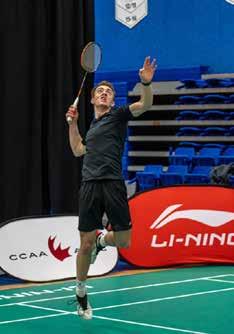
“We've kind of put King’s on the map, not just in the Atlantic League, but nationally,” Mason says. Even more, the powerhouse King’s team has shown that Atlantic Canada is a “force to be reckoned with” not to be taken lightly by the bigger provinces,
For the first three years Noah Lawless played for the UKC Blue Devils men’s rugby team, they didn’t win a single game. Fast forward to this year—the fifth-year Bachelor of Arts student’s final year on the team and his second year as captain—and the Kingsmen have just finished an undefeated season. They took home both the league and Maritime cups too, for the first time in 10 years. “You definitely feel like you’ve really helped turn something around. You definitely feel like you helped build something,” Lawless says.
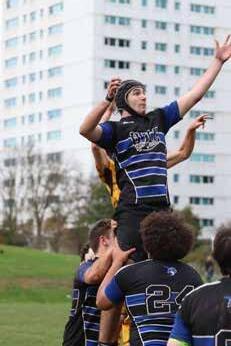
The team played for the Maritime championship in Fredericton, N.B., on a cold, rainy day on a mud-covered field. “We grabbed that trophy, we took one picture and we got … off the field into the shower— we were happy to win but first and foremost we were trying not to get hypothermia,” he laughs.
Lawless attributes the team’s incredible success this year to a strong core group of senior players, the recruitment of more athletes, a stellar coach and the fact that the team gets along really well. “We’re all great friends, and there’s no animosity between players so that really helped us be cohesive and helped us have that extra intangible step up,” he says.
Head Coach Geno Carew says full credit goes to the players, especially the ones who stuck with the team through the “disappointing” seasons. “The plan was to grow the program towards this, but we didn't expect to hit this level this quickly,” he says. The coach says the goal now is to advance to the first division “and see how we do there against the best of the best in the Atlantic provinces.”
he explains. At last year’s CCAA National Championships in Edmonton, Mason won his third silver medal in a row in men’s doubles alongside teammate Sam White. In mixed doubles, Jack Ronahan and Anna Gillies also took home a silver medal. “Just being a part of helping (the team) grow and start this dominance that we’ve had lately, it feels really good,” Mason says.
Five members of the King’s badminton team represented their home provinces at the Canada Winter Games in Prince Edward Island this year with Ritu Shah winning silver for Nova Scotia in the women’s singles category and Thomas Ashton winning silver for N.S. in the men’s singles. “So many of the good players from Atlantic Canada end up at King’s, and I’m so lucky to be a part of such an incredible team like this one,” says firstyear Bachelor of Science student Shah.
The Blue Devils women’s volleyball team is on track to have their best season ever. The team was tied for first in the league for much of this season but slipped to fourth place after a few injuries and a couple of tough matches. They’ll be heading into the playoffs in late February, and Head Coach Beate Shannon has full confidence her team can make history.
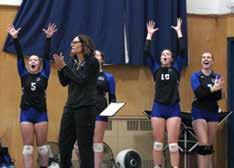
“I have a very young team and I’m really proud of how they’re playing,” she says. The roster is made up entirely of first-, secondand third-year students. It includes the top hitter in the league for kills per set, FYP student Frances Cooke, who was named ACAA Rookie of the Year. The team also features the second and third blockers in the league for blocks per set, first-year Bachelor of Science student Kaitlyn Legault and second-year journalism student Elena Neufeld.

Shannon says a key to the Blue Devils’ success is the team environment. “They're a very competitive and a very supportive group. Regardless of who is on the floor, the bench is 100 per cent behind the players and it's really great to see.”
First-year Bachelor of Arts student and ACAA Rookie of the Year Michael Zinck has been selected to participate in a U23 selection camp hosted by the Halifax Wanderers FC in February. He’ll join 40 of the best young soccer players in Atlantic Canada for three days of training where he’ll be watched closely and hopefully be one of 20 athletes chosen to join the U23 exhibition team. After that, Zinck’s dream outcome is to eventually play for the professional Wanderers team.
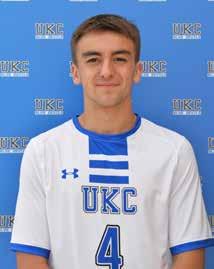
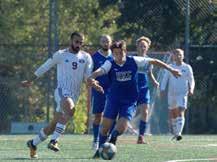
When he found out he was selected, “I immediately jumped up from my chair and I called my friends,” Zinck says. “I want to go there and show them there [are] good players at King’s.”
“This is a huge deal,” says Head Coach Jamie McGinnis. He explains it’s very rare for athletes from the small colleges league (ACAA) to be chosen for this camp. And at 19 years old, Zinck’s accomplishment is even more impressive. “I’m just incredibly excited for him. He works so hard. He's such a great teammate and he deserves his opportunity,” McGinnis says.
Team captain of the UKC Blue Devils men’s basketball team Ethan Merlin has dedicated his life to combatting the stigma against people with intellectual disabilities. His passion for inclusion in sport was inspired by his childhood in Sydney, Cape Breton spent playing basketball with his neighbour who has Down syndrome. Merlin honours this commitment through motionball, a non-profit organization that raises funds and awareness for Special Olympics. He is a committee member in Cape Breton, a member of the National Leadership Council, and the co-director of the Dalhousie motionball University (“motionballU”) chapter. The program was created to give “Canadian university students the opportunity to create meaningful, relevant ways to support Special Olympics through their own on-campus initiatives and events.”
To Merlin, “it’s just seeing the need for a more integrated and inclusive community in general.”
As part of his work at the Dalhousie motionballU chapter, Merlin has been organizing the annual Marathon of Sport, an event where a group of friends is paired with a Special Olympics athlete to participate in a day of various sports competitions. The teams win based on fundraising and team spirit, not athleticism. “It’s all solely for treating these athletes like they’re the all-stars, giving them the attention and friendship that they deserve,” Merlin says. The marathon takes place on March 25.

“I just love doing it,” he says. “I do get joy out of just seeing the smile on everyone’s faces and making these friendships and knowing that I impacted a life in a positive way.”
Merlin plans to bring motionballU with him wherever he goes. “Wherever I get a permanent job, I’ll be involved in their city event. If they don't have one, I’ll start one. I’m going to leave my mark in a few different spots, I hope.”
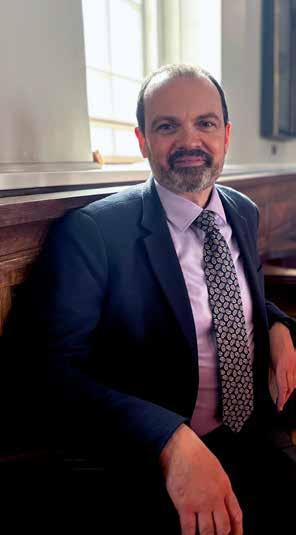 by John Mackay, BA’71
by John Mackay, BA’71
Music, a King alumnus once said, makes the Quad go round. From impromptu student jam sessions to the college’s renowned chapel choir, music has always been core to who we are.
Recently King’s welcomed a new Director of Chapel Music. Neil Cockburn joined the university in October from Calgary, where he was Director of Music at the Anglican Cathedral Church of the Redeemer, taught organ at the University of Calgary and played organ and harpsichord with the Calgary Philharmonic. Born in St Andrews, Scotland and educated at Oxford and the Royal Northern College of Music in Manchester, Cockburn’s arrival at King’s marks a new beginning for choral music at the university.
Were you aware of King’s Chapel Choir before working here became a possibility? And what motivated you to take the position?
I actually have to thank the pandemic for bringing the King’s Chapel Choir to my attention. As dreadful as Covid was, during that period we were all putting our music online and I heard some of the choir’s recordings. I was struck by their very high level of music making.
As for me, I was in Calgary for 22 years. It was time for new challenges and a new city.
You’ve come from directing a cathedral choir to a university chapel choir. What are you doing differently? And what’s exciting you?
The high level of musical ability in the choir is certainly exciting. I’m working with students and I have the opportunity to train and mold and shape them, to work
with them in the early parts of their careers. King’s is a university and that’s exciting as well. I want to provide a broad-ranging experience … group participation, team building. There are technological things happening in the music world for us to consider. I want this to be a learning experience even if it’s not for credit. It’s more than just turning up and singing.
You’re working in a college chapel now, not a cathedral. How does the experience differ—for the singer and the listener? It’s in the acoustical properties of the room. In the intimacy of the King’s Chapel there’s a more immediate passing of the message to the congregation, who are very close to you. There’s room for a lot more subtlety. We can do almost a whisper and really draw the listener in. For its size the chapel has a warm, welcoming blossom to the sound. It is a lovely, gentle place to sing.
You’re directing both the King’s Chapel Choir and the King’s Chorus. Can you differentiate them for us?
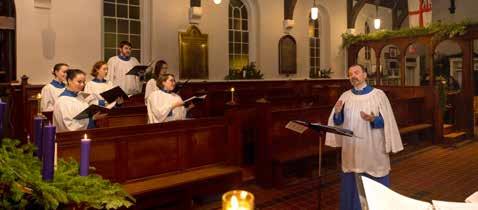
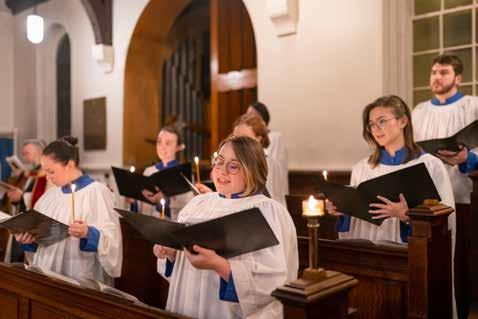
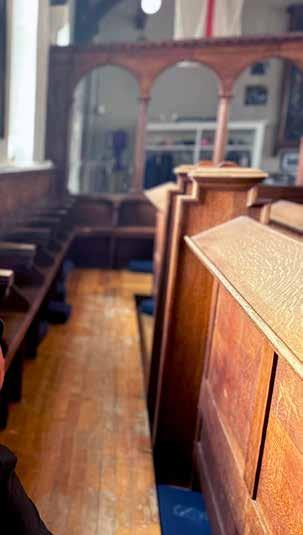
The Chapel Choir sings the chapel’s Anglican services. That’s Choral Evensong on Wednesday and Eucharist on Thursday. And the choir has a good number of additional performances at King’s and in the community throughout the year. As I said, the singers in the Chapel Choir have a high level of musical ability. We have some great singers in the King’s Chorus although with the chorus we don’t turn anyone away. With the chorus we have 12 weeks to rehearse the repertoire for one performance. With the choir we have one rehearsal each week and we’re off.
You’ve been working with the choir for about six months now, what was your initial take and what are you seeing for the future?
I was struck by their ability to read music and quickly perform it. They have terrific
sight singing skills and as a result, I’m able to broaden the repertoire.… We’re singing a lot of new repertoire and we’re branching out into more recent work. In time I’d like to look a little less towards English composers and more towards other parts of the world. And I’d love to commission some pieces. The choir has an energy and hunger for it.
Any plans for the King’s Chorus?
I would love to see more community members in the chorus, so I want to take that message out that the chorus is open to anyone. There’s this terrific emphasis on diversity and inclusiveness at King’s and we can reflect this.
I’d like to do some locally inspired programs, like a Celtic concert, or invite a First Nations artist to sing with us or bring in other artists, like dancers, to enhance the concert experience. We could create a multi-artist experience.
I want this to be a learning experience even if it’s not for credit. It’s more than just turning up and singing.
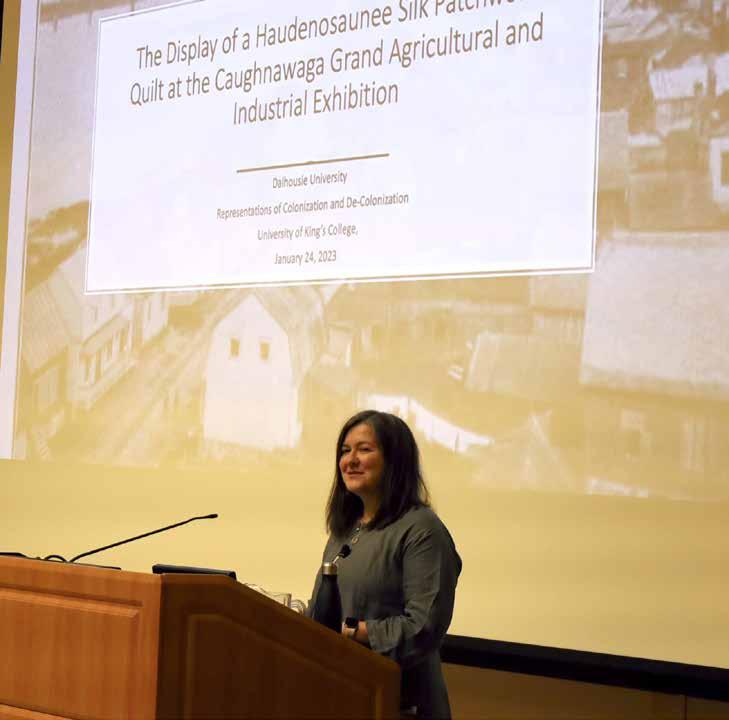 by Jessica Casey
by Jessica Casey
The 2023 Public Lecture Series includes eight guest speakers, each offering unique backgrounds and perspectives to the same central theme: Representations of Colonization and Decolonization. Designed by faculty across the university’s three upper-year honours programs, the series and its component course provide an opportunity to reflect on the university’s own colonial history. These include the direct ties between the university and slavery, established in the 2020 report, King’s & Slavery: A Scholarly Inquiry. As King’s is an Anglican-founded institution, this series will also examine the legacy of the church’s role in the violent cultural genocide of Indigenous Peoples and lifeways. The spirit of this lecture series is that these conversations cannot be purely internal, but they must also engage openly with the public.
first with the speaker’s work and related scholarship, discuss it with peers in a small seminar, view the lectures and engage with them in a series of essays.
The opportunities the format creates truly reflect the community-centered culture of learning that King’s offers.
Watching this lecture, I was fascinated by Binkley’s analysis of this Haudenosaunee quilt as a practice and a vehicle for passing forward lifeways, wisdom and good conversation.
The emphasis of process over product made me think of the resilience of muscle memory, and how much craftwork was done in private, away from the prying eyes of priests and Indian agents. I reflect on the many Indigenous women I’ve had the blessing to call my relations who had their language taken from them, but still have the teachings to weave baskets, bead earrings or work with leather.
THE PUBLIC LECTURE SERIES kicked off in late January with Dr. Lisa Binkley’s lively analysis of an item that cannot be seen, displayed or even proven to still exist: a Haudenosaunee patchwork quilt.
Binkley is an award-winning professor at Dalhousie with research interests in Indigenous history, human geography and the study of material and visual culture. Her talk asks the question: why should we only study things we can touch, point towards, photocopy or stare at behind museum glass?
The patchwork quilt might not have a physical form that can be pointed at, but it does have a story to tell and Binkley unfolded it with care. She introduced the story of this quilt with the Caughnawaga fair, a government-planned display of products and performances by the Haudenosaunee people. It included over 4,000 settlers who traveled to watch the Indigenous Peoples and their artwork. These exhibitions froze Indigenous culture into consumable snapshots and presented the “advancement” of Indigenous people in order to prove success in “civilizing” tactics.
The lecture included what was, perhaps, the most compelling question period that I’ve ever seen in my university life. I lost track of how many questions there were, each one diving deeper than the last.
Dr. Justina Spencer is an art histori-
an and Assistant Professor at King’s who worked with Assistant Professor Dr. Tim Clarke to design the series and its component course. “It was very moving for me, as an art historian,” Spencer says, explaining that she was struck by the lecture’s analysis of an item that was intangible and invisible. As a result, Binkley necessarily focused on how the item is woven into the social context and community life of the people, rather than seeing it purely as an aesthetic object. “We have to pay attention to the history of making,” Spencer concludes.
The component course is interdisciplinary and cross-listed between the History of Science and Technology, Contemporary Studies and Early Modern Studies programs. Its intent is for students to engage
Though the Haudenosaunee artists used manufactured needles and strategically appropriated non-Indigenous artistic methods, the process of craft-making still existed within Indigenous community life and showed Indigenous lifeways. Therefore, it is nearly impossible to say that this quilt is “colonial,” “decolonial” or “anti-colonial.” In a more real way, the quilt symbolizes a hybridity of Indigenous lifeways and settler-imposed traditions, it is the commemoration of a cultural contact zone.
It is a unique treat to take a lecture series course this year. I look forward to reflecting on notions of Indigenization and decolonization and navigating heavy topics with a gentle optimism about the conversations it will spark in the King’s community and beyond.
Jessica Casey is a third-year Bachelor of Arts student pursuing a combined honors in Contemporary Studies and Social Anthropology.
I reflect on the many Indigenous women I’ve had the blessing to call my relations who had their language taken from them, but still have the teachings to weave baskets, bead earrings or work with leather.
Addressing the Truth and Reconciliation Commission’s Calls to Action with new initiatives to make King’s a place where Indigenous students, faculty and staff thrive
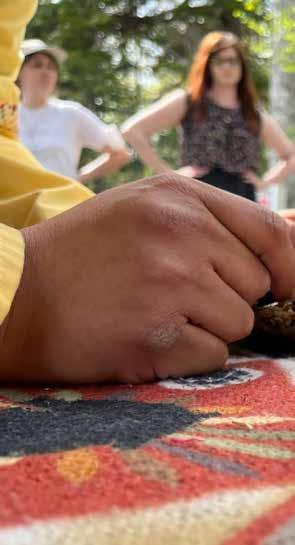
A SUCCESSION OF NEW and developing initiatives put into action King’s commitment to become a more welcoming university for Indigenous students, faculty and staff and to be better guests on the unceded Mi'kmaw land on which the university is located. In 2015, the Truth and Reconciliation Commission of Canada published 94 Calls to Action, “to redress the legacy of residential schools and advance the process of Canadian reconciliation.” Among these are calls to action that address the unique role that post-secondary institutions must play.
Beginning with a focus on Call to Action 86, which specifically addresses journalism education, King’s is taking steps to embrace the spirit of Reconciliation and implement measurable changes.
The first students in the Mi'kmaw journalism cohort, unique in Canada, join the King’s community this September. The cost of tuition will be fully covered by the university for up to three Mi'kmaw students
to enroll in the undergraduate Bachelor of Journalism (Honours) program each academic year, and the cohort will continue to expand over the next four years. Cohort models operate on the premise that a group of students who study together in a program benefit from the relationships they form and the support they provide one another throughout their education. In the case of students from underrepresented communities, the ability to form relationships with peers who share the same cultural background is considered a strong enabler of success. Consistent with multiple calls to action, the funding offered to students in the cohort will ensure that neither the students, nor their families and communities, will be responsible for bearing the financial burden of tuition.
The cohort initiative was developed in close consultation with representatives of the province’s Mi'kmaw communities, King’s Board of Governors and government. At
the time of its announcement, President William Lahey said that as Nova Scotia’s only university granting degrees in journalism, King’s must take every opportunity to address Call to Action 86 and the other calls to action related to education.
“We must act in an ambitious and impactful way that reflects what King’s is well equipped to contribute and what Mi'kmaw leaders have told us they think King’s can uniquely offer.… Such contributions must be central to our efforts toward meaningful reconciliation with the Indigenous Nation on whose land this university stands.”
New supports, including what is believed to be Atlantic Canada’s first Nsukwi' (Auntie-in-Residence) will encourage the success of all Indigenous students. Auntie Emily Pictou-Roberts, BA(Hons)’20, of Millbrook First Nation, will serve as a mentor to Indigenous students and bring Indigenous perspectives, knowledge and approaches to support student wellness and
community building. “… My ultimate goal is to foster a safe and welcoming community for L'nu students by facilitating access to information and supports, sharing Indigenous knowledge, providing opportunity for ceremony and serving as an advocate,” said Pictou-Roberts. The role was created and is shared with Mount Saint Vincent University.
Additional initiatives in development include funding an Indigenous Student Advisor and creating a dedicated space on King’s campus for Indigenous students.
These initiatives will benefit from the creation of King’s Mi'kmaw and Indigenous Advisory Circle, which held its first meeting in December of 2022. Comprising student, faculty, alumni and community representatives from Mi'kmaw communities in Nova Scotia, Quebec and Newfoundland and Labrador, as well as members of King’s administration, the circle will ensure that Indigenous perspectives guide the university’s ongoing work on Reconciliation.
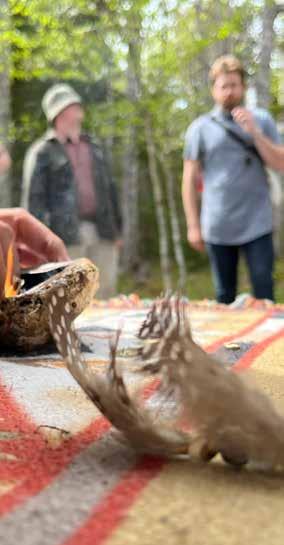
Students and faculty of the 2022 Reporting in Mi'kma'ki class won a Canadian Online Publishing Association Gold Award (pg. 21) for “Kwe' Eskasoni,” a multimedia story published on The Signal. First offered in 2021 and generously funded through a donation by Kathy Pratt LeGrow, BA’70, Reporting in Mi'kma'ki is a journalism course that teaches students how to report Indigenous stories responsibly. Designed and offered in collaboration with the Mi'kmaw community of Eskasoni and the Nova Scotia Community College, the course is delivered through a combination of workshops, in-class learning and time spent in Eskasoni. Students learn these principles by reporting on a theme that changes each year: “Kwe' Eskasoni” explored Mi'kmaw-led conservation work, while the 2023 class will anticipate the arrival of the North American Indigenous Games in Halifax in July by examining the important role of sports in Indigenous communities and culture.

We must act in an ambitious and impactful way that reflects what King’s is well equipped to contribute and what Mi'kmaw leaders have told us they think King’s can uniquely offer.

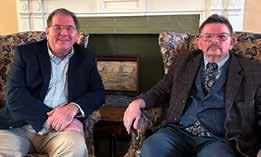
In early December the Alumni Book Club returned with a discussion on Dr. Neil Robertson’s, BA(Hons)’85, book, Leo Strauss: An Introduction, that featured Robertson in discussion with fellow member of Foundation Year Program faculty Dr. Thomas Curran. The pair discussed the German-American philosopher’s abiding influence on the development of “great books” programs in Canada and the United States, and how Strauss’s school of thought has impacted King’s very own Foundation Year Program. Find out about upcoming book club and other events at ukings.ca/alumni/events/
For the second year running, faculty participated in an introduction to the Mi'kmaw language, this year inviting staff to participate. The purpose was to improve pronunciation of Nova Scotia place names and Mi'kmaw words in general, so as to increase cultural competence. The Smith-Francis orthography was covered and some very basic conversation, over five one-hour virtual sessions on Zoom, with Dean Simon, a student and teacher of Mi'kmaw in Newfoundland.
Wela'liek, Dean! [Thank you, Dean!]
The King’s Theatrical Society brought Greek theatre back to the steps of the library last fall with a production of The Bacchae for Classics in the Quad. On a chilly October evening the community came out in force to watch firstyear student Thunder Defayette’s portrayal of a vengeful Dionysus punish the city of Thebes in a deadly campaign to prove his divinity.
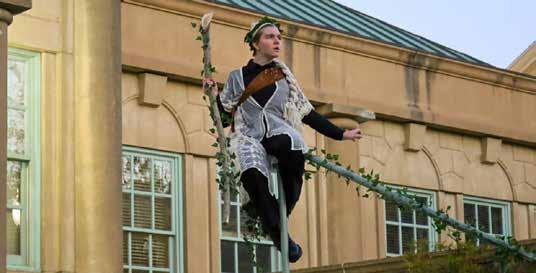
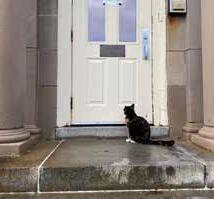
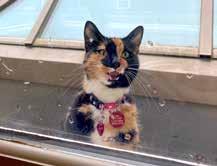
This curious feline has charmed students, staff and faculty alike on regular visits to campus. From a popular Instagram page that tracks her whereabouts to starring in a segment about cats on CBC Radio’s The Current, it’s safe to say Sh*rty made quite a name for herself this year. If you see her skiddling around the Quad be sure to say “hi”—she’s very friendly!

King’s Chapel now offers parts of the Book of Common Prayer (BCP) in Braille for anyone with a visual impairment. The BCP is used for both the Choral Evensong and Choral Eucharist services. Chapel Administrator Peter Bullerwell, BA(Hons)’09, was assisted by Reverend Michael Lyons in Saskatchewan to develop the transcription required to make the Braille copy, which was then produced by the Canadian National Institute for the Blind’s transcription service.
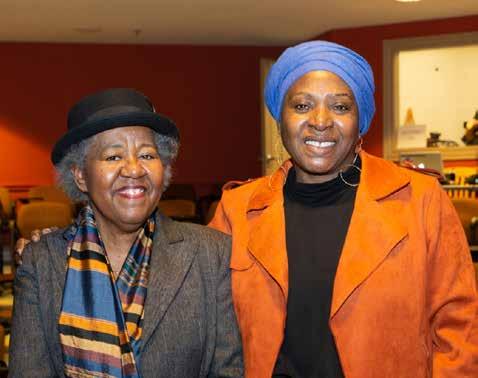
A Black People’s History of Canada presented Portia White: A Vibrant Presence in the KTS Lecture Hall. The event was at full attendance with members of the community coming out to see the debut of the new short video on White, by Killam Research Chair in Black and African Diaspora Studies at Dalhousie University Dr. Afua Cooper. The video highlights the life of one of Canada’s first contraltos—an operatic term for the lowest female voice register. Featuring stories from two of White’s relatives, Shelia White and Dr. George Elliot Clarke, Dr. Cooper and White’s biographer, King’s Inglis Professor Sylvia D. Hamilton, the video aims to illuminate the life of one of Canada’s finest musicians. Pictured top: Charisma Walker. Pictured bottom: Dr. Cooper (right) with Sylvia D. Hamilton (left). Photos by Paul Adams.
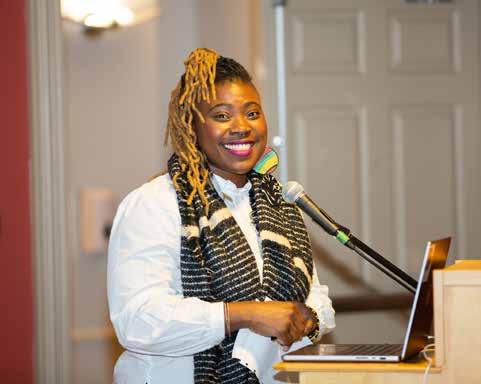
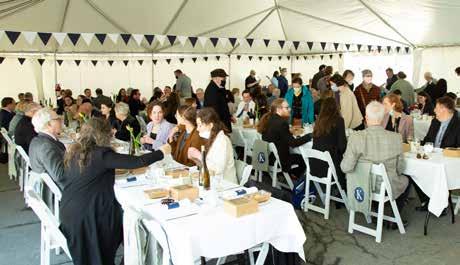
The sun came out for a long-awaited moment as King’s welcomed the classes of 2020 and 2021 back to the Quad for in-person graduation celebrations. Friends, family, faculty and staff filled the Quad twice in one day, with separate ceremonies held to honour the alumni who graduated during the two years when the pandemic precluded an in-person Encaenia. King’s awarded an honorary Doctor of Civil Law, honoris causa to Nova Scotian troubadour, singer/songwriter Chris “Old Man” Luedecke and Sherri Borden Colley, whose honorary doctorate will be formally conferred at a future date. Borden Colley delivered a video greeting to the graduates.
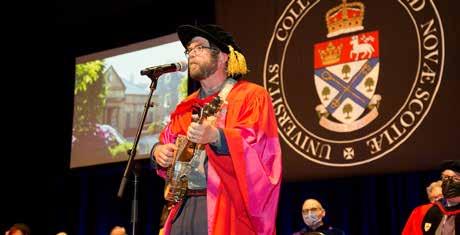
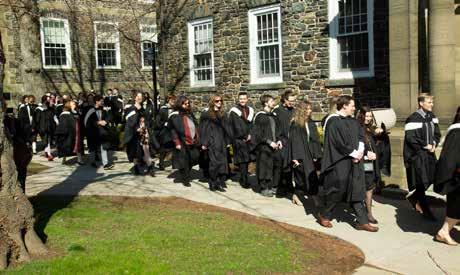
Sexual Health and Safety Officer (SHSO)
Jordan Roberts and Student Support Advisor Isaac Wright introduced themselves and the many supports their offices provide to students during Orientation 2022. The SHSO organized O-Week activities focused on promoting a culture of consent on campus, including a talk with staff from queer, feminist-owned shop Venus Envy.

The Chapel Choir traveled to Truro, N.S., for a special concert led by Director of Chapel Music Neil Cockburn (pg. 10) called Sing Choirs of Angels (A King’s Christmas). The performance included seasonal favourites like O Come All Ye Faithful as well as more recent compositions Ave Generosa and A Spotless Rose by Norwegian composer Ola Gjeilo.
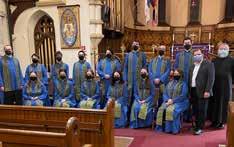
When it comes to Formal Meal, a long black robe never goes out of style. Students, faculty, staff and guests looked their best as they enjoyed the first Formal Meal of the academic year in Prince Hall.
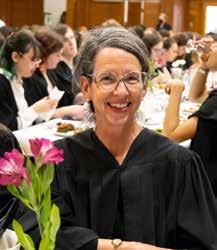
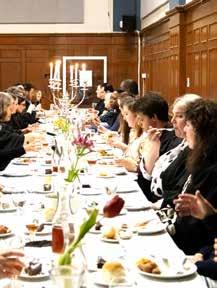
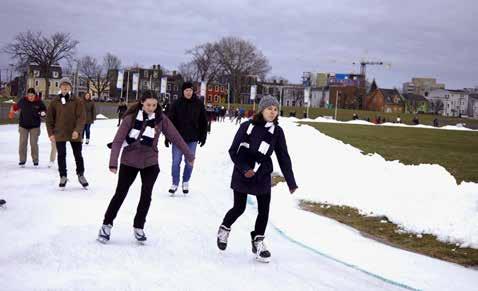
President Lahey led hearty students and staff to brave the cold at the Emera Oval ice rink on the Halifax Commons in January. After an exhilarating afternoon of figure eights (and figure sevens, sixes and fives…) the group made their way back to the President’s Lodge for warm drinks, cookies and central heating!

First-year students Daniel Choi and Sherif Bahaa Eldin play a giant game of chess on the Quad during O-Week.
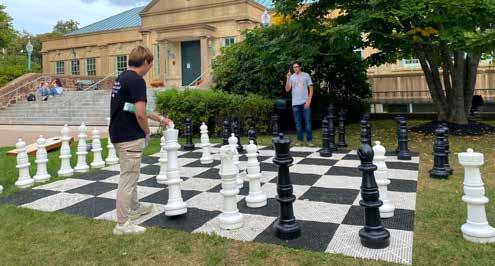
Toufah Jallow was a teenage scholarship winner in The Gambia who was raped by the country’s then-president Yahya Jammeh. Kim Pittaway, Cohort Director in the Master of Fine Arts in Creative Nonfiction program, worked with the anti-rape activist to bring the story of this crime and what came next to the page in the memoir Toufah: The Woman Who Inspired an African #MeToo Movement (Penguin Random House, 2022). Toufah is nominated for the 2023 Forest of Reading Evergreen Award. Organized by the Ontario Library Association, Forest of Reading is Canada’s largest recreational reading program. The book was also a 2023 Top Ten selection of Rise: A Feminist Book Project by the Feminist Task Force of the American Library Association, which each year recommends recent books with significant feminist content for readers from birth to 18 years old.
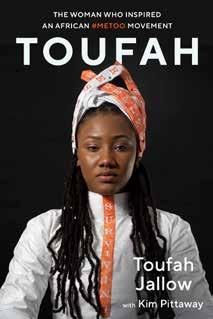
Assistant Professor Pauline Dakin, MFA’15, worked with CBC Podcasts to adapt her award-winning book, Run, Hide, Repeat: A Memoir of a Fugitive Childhood (Penguin Random House Canada, 2017) (pg. 22). Named one of the top podcasts of 2022 by Amazon, Run, Hide, Repeat was no.1 on the Apple Podcasts charts in Canada for four weeks after its release. By mid-February 2023, it had surpassed one million downloads.
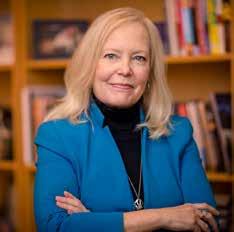
Dr. Dorota Glowacka, Holocaust scholar and Professor in the Contemporary Studies Program, is the Principal Investigator for a Connections grant awarded by the Social Sciences and Humanities Research Council of Canada (SSHRC) to create a week-long workshop in May 2023, “Trauma, Memory and Material Culture.” A collaboration between the National Museum of the American Indian (NMAI) and the United States Holocaust Memorial Museum’s (USHMM) Mandel Center for Advanced Holocaust Studies, the workshop aims to explore the connections between the histories of the Holocaust and of the genocide of the Indigenous Peoples of North America, bringing the two museums into a meaningful conversation with one another.
Dr. Glowacka has also been awarded a grant, the “Excellence in Research Initiative,” from the University of Wrocław in Poland. The grant is to conduct a series of workshops at the University of Wrocław in February 2023, on the subject of genocide and cultural destruction.
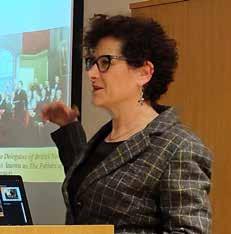
Students and faculty from King’s and Nova Scotia Community College who participated in the 2022 Reporting in Mi'kma'ki course have won Gold for Best Multicultural Story in the Academic category of the Canadian Online Publishing Awards. The Gold Award was given for “Kwe' Eskasoni” published on The Signal, the online platform for student work run by King’s journalism programs. Comprising text, video and photography, “Kwe' Eskasoni” links to four distinct stories on Mi'kmaw-led conservation work. The full list of students and faculty who participated in Reporting in Mi'kma'ki in 2022 is: Haeley Cook DiRisio, Reporter; Mitchell Ferguson, Reporter; Caitlyn Mearns, Reporter; Lauren Phillips, Reporter; Connor Sampson, Reporter; David Joseph Shuman, Reporter; Yara Younes, Reporter; Trina Roache, BJ’00, Editor; Erin Moore, Editor; Terra Tailleur, BJ’97, MJ’13, Editor.

In provinces across the country the Queen Elizabeth II Platinum Jubilee Medal and Pin programs have commemorated the seventieth year of the late Queen Elizabeth II by recognizing the contributions of outstanding members of the community.
Numerous members of the King’s community were honoured through these programs, including Board of Governors Chair Douglas Ruck, KC, BA’72, President William Lahey, Chancellor Debra Deane Little, Dr. Roselle Green, DCL’15, Dip’J65 (pg. 61), Inglis Professor Sylvia D. Hamilton, Assistant Dean of Housing and Ancillary Services Tim Ross, Accessibility Officer Michelle Mahoney (pg. 30) and Instructor Michael Creagen.
Help us to complete our list! If you, or a King’s community member you know, received a Platinum Jubilee Medal or Pin, we invite you to email Alumni Relations Manager Kimberly Gosse, Kimberly.gosse@ukings.ca or call the Advancement Office at 902-422-1271, ext. 152.
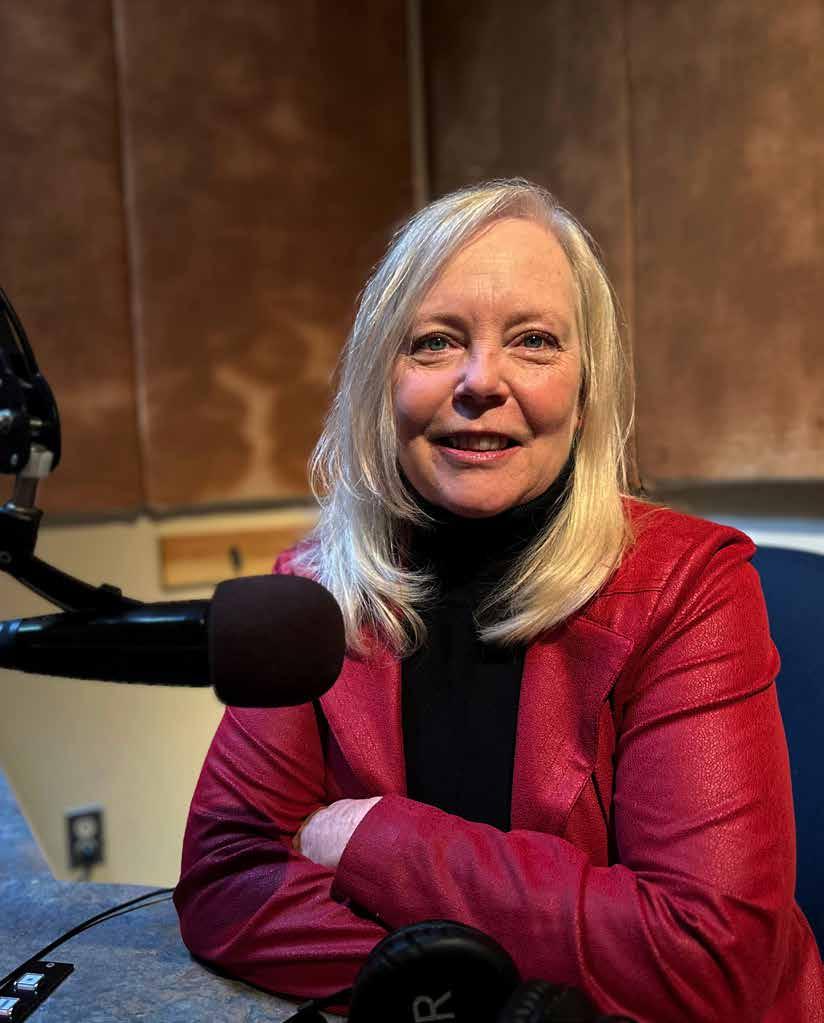
“IT
should do,” says Assistant Professor Pauline Dakin, MFA’15. “I love this medium.”
Dakin is describing her reaction when a colleague suggested turning her bestselling memoir Run Hide, Repeat: A Memoir of a Fugitive Childhood into a podcast.
The award-winning former CBC Radio reporter/producer now teaches at King’s. When the idea was proposed, just over a year ago, Dakin was game. And she thought she was ready.
Dakin’s memoir describes her childhood as her family fled home and started life over, twice. When she was in her 20s, her mother told her why. She said they were fleeing the mafia.
Dakin was stunned.
Written while she was a student in King’s Master of Fine Arts in Creative Nonfiction program, the memoir tells this story and sheds light on the complex reality that Dakin eventually learned was behind her unusual childhood.
What she wasn’t ready for was the podcast’s impact—on listeners and on her.
“My parents’ voices are in it,” she said. “I had this trove of old cassette tapes that my
mother had recorded. And there’s my voice when I’m nine years old, and there’s our dog barking, and there’s my mother.
“Then there’s all these recordings of her and my father, you know, trying to negotiate access to kids. I mean, that was, it was hard to hear. It just took me right back to those moments that were so difficult ... Just made it all feel so much more real again. I mean, I’ve put distance between myself and this story now. Writing it helped me to do that; say, ‘Okay, that’s done. It’s over there. I’ve moved on.’ But the sound, I think, pulled me right back.”
Dakin was touching on an ancient truth—oral storytelling has power, in this case, for the creator and the listener. Podcasts have brought that power to a new generation.
“I think the real success (of podcasts) is that intimacy. It is that deep storytelling,” says Dakin, who teaches Introduction to Podcasting.
“I always tell my audio students that audio is the most visual medium … You are listening, and your visual cortex is lighting up like crazy, because you are, in your brain, producing the pictures that go with
what you’re hearing. So, it’s very cognitively engaging. And, for that reason, it’s a rich experience.”
Fred Vallance-Jones is the Director of Journalism at King’s. He also worked at CBC Radio for 15 years. “Podcasting has taken this ages-old storytelling art to a new platform and millions have newly discovered the power of stories told for the ear,” he says. “Journalism education always needs to keep up with changing technologies, and we’re doing that in our audio instruction at King’s, with more to come … I am excited about the possibilities.”
So what are the differences between podcasts and radio? One key difference is that podcasts aren’t transitory. Listening to them is deliberate.
Another difference: recording a podcast doesn’t require fancy equipment. Or a broadcasting license. This low barrier to entry results in a vast range of content: while some podcasts boast listeners in the millions, others target small communities united by a niche interest.
“It does become a community,” Dakin says. “The interests and the topics are so granular, you may have sat there thinking
FELT LIKE EXACTLY the right thing I
connects a
Podcasting has taken this ages-old storytelling art to a new platform and millions have newly discovered the power of stories told for the ear.
nobody else cares about this except me, but look, here are my people. It doesn’t matter where they are. It is that sense of belonging that is so satisfying.”
Director of Writing and Publishing Gillian Turnbull, MFA’17 is a former music instructor. She, too, highlights the role of community in podcasting, saying it’s especially evident among her music students.
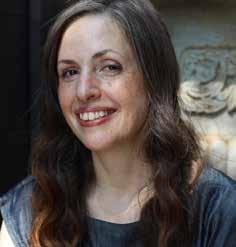
“I feel like, if they want to listen to something that’s going to affirm who they are, who their community is … they’re going to find that much more easily in the podcast sphere.”
Dakin calls podcasting “the success story in the media world.”
“At a time when you see newsrooms shrinking, and less and less investment in that kind of journalistic production, this is a place that has grown, and grown spectacularly.”
“Spectacular” is one word for it. “Frenzied” is another. According to PodcastIndex. org there are now 3.9 million podcasts in the world.
“You can see some kind of tectonic shifting going on. And I think that’s expected as any industry matures. There has been such a frenzy,” Dakin says. “And now we are sort of taking a breath.”
The number of new podcasts has dropped off since a peak of one million in 2020, to just under 800,000 in 2021 and 200,000 last year, according to Listennotes. com. However, Dakin doesn’t think the platform is going anywhere.
“Really young people are starting to discover it. High school age is where there’s a lot of growth,” Dakin says. “I think they love it because they lose themselves in it. I think it’s an opportunity to engage with ideas and thoughts and emotions.”
Dakin says students coming into the journalism programs are less interested in news
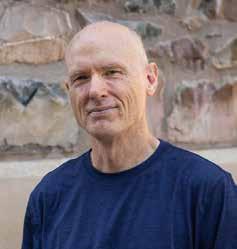
and more interested in learning long-form storytelling, whether in print, video or audio.
“I think a lot of students, their first experience of podcasting is, you know, the three guys in Hollywood who sit down with the guest (and joke around)…. But when we’re playing journalistic podcasts it’s an eyeswide, ‘Oh, THIS…’ kind-of-moment. When you really start to drill down on things, like how you use sound, and all the editorial decisions about editing, interviewing and so on, they, I think, have developed this incredible appreciation for the richness of it, that this is a real skill.”
Podcasts are also becoming an important tool in writing and publishing—both for learning about the craft, but also marketing. “The current reality of the industry is such that you have to do things you never have imagined you would do,” says Turnbull, who hosts the MFA program’s own podcast, Further Reading. She says that writers now have to do so much of their own promotion it becomes essential to get creative with using their material to sell their books.
“We’ve had one-off sessions in the past on becoming a podcaster. So, taking, maybe a part of what your book is about, and running with that as a potential series. Pauline is a great example of this coming to life.”
While Dakin’s podcasting course is offered through the journalism programs, cross-pollination is undeniable. When Introduction to Podcasting launched, professors from different universities asked to sit in and learn how to use podcasts as a teaching tool.
“It’s remarkable how much interest there is from other disciplines,” Dakin says. “In the current course, I have 26 students, and maybe a little more than a third of them are journalism students. I have students in the sciences, students in anthropology, across the board. And they’re really interested in
learning how to communicate their interests or disciplines.”
Turnbull describes a podcast assignment she gave her music students. They had to listen to a podcast on popular music and record their own podcast as a response. “I think there’s lots of room for it, certainly in the humanities, but then you think about STEM fields, a lot of people are more oriented towards oral learning and it might actually facilitate that better. I see no reason why any department shouldn’t consider (podcasting) as part of their curriculum.”
Associate Professor Mélanie Frappier teaches in the History of Science and Technology program. She says some of her students have created unpublished podcasts. “They are a great way to help students learn how to clearly express themselves orally and share the research they do with the broader community,” she says. “I would love to learn what goes into producing podcasts and see our students have access to courses where they would produce series.”
Vallance-Jones agrees. “I see podcasting as having great potential not only for our own teaching, but for that of other units at King’s. You can tell any kind of story verbally. [The Foundation Year Program] after all, epitomizes that age-old format, the lecture. We are all storytellers in a way.”
“This is my first time teaching the Introduction to Podcasting course as an elective available to anybody,” Dakin says. “I find it so wonderful to watch students engage with this. Some of them so deeply.
“Something about listening to these things we’re listening to is cracking you open. Some of that is emotionally. And some of that is just such delight at the possibilities that you hadn’t really thought deeply about before. It’s been a really satisfying thing. And it makes me excited about what they might produce.”
When we’re playing journalistic podcasts it’s an eyes-wide, ‘Oh, THIS…’ kind-of-moment.
When Ritu Shah moved with her family from Pune, India, to Bedford, N.S. in 2019, she wasn’t slowed down by the challenges of being the new kid in school. A talented competitive badminton player, she joined Badminton Nova Scotia and subsequently won her first national tournament three months after arriving in Canada. When she couldn’t find an outlet for her interest in neuroscience, she started a club in her high school. She also found time to volunteer.
It’s not hard to see why Shah was selected as one of 60 Loran Provincial Award recipients from across Canada. Recipients are selected on the basis of integrity, courage, compassion and leadership. The prestigious award can be applied toward any accredited Canadian university and this year, Shah is one of two recipients who have joined the King’s community. “King’s has an amazing badminton team and I’m not sure everyone knows that,” she says. “A lot of the great players in Atlantic Canada go to King’s.” Shah is undoubtedly one of those “great players,” and was selected to play for Team Nova Scotia at the 2023 Canada Winter Games where she won a silver medal for women’s singles.
Luke Kotaska’s affinity for leadership is every bit as impressive. Growing up in Yellowknife, N.W.T., Kotaska was active on the rink, the field and in the great outdoors. A strong hockey player, he was appointed captain of the Development Program Hockey team for the 2021-22 season. A few months later he went to the 2022 Canada Summer Games as captain of Team N.W.T’s men’s soccer team. Kotaska channeled his love for the northern landscape into becoming a guide with the Ayalik Fund, a nonprofit that helps Inuit youth build confidence through outdoor adventure. His multiple accomplishments and community work brought him to the attention of the Loran selection committee and like Shah, he was selected for a provincial award.
Kotaska says King’s offered the right combination. “I wanted to go to a smaller school, a personal school, but I also wanted the experience of living in a good-sized city.” Now at King’s, he’s one of the few first-year students recruited to the Blue Devils men’s soccer team. And he loves the Foundation Year Program (FYP). “FYP is amazing. I’m a big fan and supporter of it. It’s a lot of work but you will get as much out of it as you put in.”
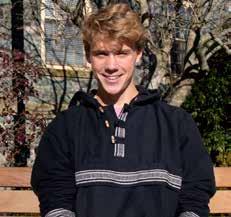
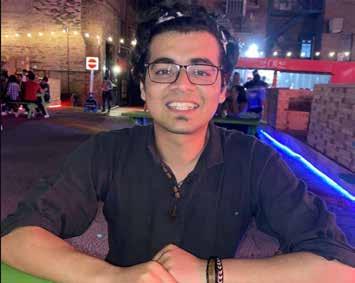
It’s the gold standard in Canadian journalism scholarships and for the second year in a row, a graduating King’s student is one of a handful of recipients. Shlok Talati, a second-year Master of Journalism student, has been awarded the Joan Donaldson CBC News Scholarship, which offers a four-month paid internship with CBC News. “The Donaldson Scholarship is highly competitive, but Shlok clearly stood out among the applicants,” says Assistant Professor Terra Tailleur, BJ’97, MJ’13. “CBC is fortunate to have him.” Talati came to King’s from his native India, where he worked as a local reporter. He will work on The World This Hour and Metro Morning in Toronto before moving on to a placement elsewhere in Canada. At King’s, Talati wrote for The Signal and covered immigrant issues for New Canadian Media. “The way I’ve grown as a journalist at King’s is unbelievable,” Talati says. I’ve learned so much about Canada, about Indigenous and equality issues, that I can take with me to the CBC.”
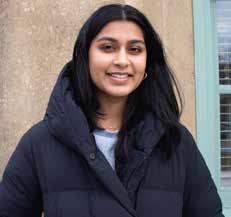
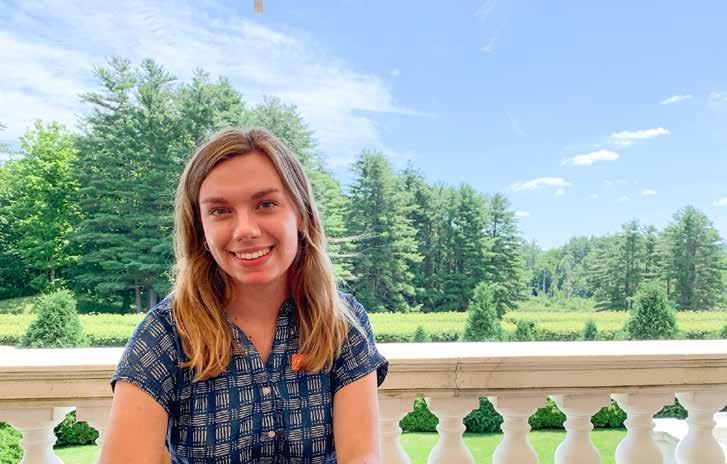
During our conversation, fifth-year student Lucy Boyd is relaxed and composed, but it would be surprising if she isn’t experiencing more than your average bout of student stress. It’s enough that she’s on the final push toward graduation, working on her Early Modern Studies thesis and bringing five successful years of life in the King’s community to a close. But layer in the fact that Boyd, at time of writing, will soon travel to Montreal for a rigorous series of interviews. She is one of 88 finalists for the McCall MacBain Scholarship, one of the most prestigious and financially generous graduate-level scholarships in Canada and internationally. Graduating students from more than 1,200 universities around the world have applied.
The mandate of the scholarship is for “a diverse group of scholars who aspire to lead with purpose—individuals who have demonstrated leadership potential and an inner drive to make a positive impact on other people’s lives.” It’s easy to see why Boyd was selected: her sense of purpose was there from the start and helped her identify an affinity for King’s. It proved the right foundation for her leadership instincts to emerge.
Born and raised in Ottawa but with Halifax roots, when she came for a campus tour, Boyd immediately felt at home both at King’s and in the city. “I went to a FYP lecture and I was so warmly welcomed by students and faculty. That underlined for me that King’s was the right choice. I wanted to be a part of a community and I got a sense of how vibrant and caring the King’s community is.”
Over her five busy years, Boyd helped reorganize the Dalhousie Student Union Archives and she serves on the board of the Nova Scotia Women’s History Society, to name but two. But it was through the King’s Literary Society that she built on her appreciation of the King’s community and explored her leadership potential. “I’m a big reader and it was natural for me to join a group that brings together people who love, and want to talk about, books. I felt honoured to be the Society’s president for a couple of years,” she says. Boyd wanted to make the Society more central to life at King’s. “I thought it would be great to make as many connections with the broader community as we could and make it a stage
for contemporary writers to share their work. Writers meeting readers.” The Society created themed nights, celebrating Pride and ecological issues among other topics.
Boyd led the group through the sensitive issue of its renaming from the Haliburton Society to the UKing’s Literary Society. “We thought about it carefully,” she says. “The process of renaming invites a lot of interesting questions about the role of renaming in our society. How do we evolve? I certainly don’t think those questions were resolved but we were clear that as an active group on campus we had to prioritize making sure that everyone felt safe and comfortable.”
Graduate work in archival studies, possibly at McGill, is next. “I want to explore the philosophies behind how we share information in this age when we have access to an overabundance of it,” she explains. “How should we deal with sensitive information? How do we ensure the archives and institutions that store information are open and accessible to everyone? To pursue this at graduate school and then work at one of our great cultural institutions … this is what I’m hoping to make my life’s work.”
The Debra Deane Little and Robert Little Academic Scholarships for Varsity Athletes are four-year, renewable scholarships valued at up to $20,000. The scholarship recognizes students who combine academic excellence with athletic skill. Forty-two students hold Deane Little Scholarships for the 202223 academic year.
First-year Foundation Year Program (FYP) student Norah DeWolfe recently finished her first season on the Blue Devils women’s soccer team where she was an attacking midfield and striker. She’s proud to be a Deane Little Scholar. “It’s really great that there’s a scholarship for student athletes—people who have done well academically and in sports. Because ultimately, we’re here to study and sports is an added bonus.”
Fellow FYP student Frances Cooke is a left-side hitter on the Blue Devils volleyball team and one of a handful of FYP students who play on King’s varsity teams. Cooke says FYP drew her to King’s and so far, it has exceeded her expectations. “The way it’s structured, the papers and the degree of choice, my tutorial group and the tutors … you’re surrounded by people who really think about the work.”
Sam Hodd is also in FYP. Hodd chose King’s because he wanted a place where he could excel in sports and study journalism. Now, with his first season on the Blue Devils men’s soccer team behind him, he says that King’s is exactly what he hoped it would be. “[King’s] is a really positive environment. The coaches are great. We have a really great sense of team, everyone values and respects their teammates and we all get along. That played a huge part in our success on the field this year.”
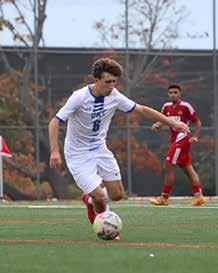
The Sobey Family Scholarship, worth $50,000 over four years, has been offered to King’s students entering the Foundation Year Program (FYP) since 2014. The scholarship is awarded on the basis of proven leadership skills, significant involvement in school or community activities and academic achievement.
Celia Fournier remembers exactly what she was doing when she found out she’d won. “I was in class and I stepped out into the hallway to take a call…. I was listening to what they were saying and I didn’t quite believe it.” She took a minute, sat down on the steps and then called her parents. “We were all crying.”
Now in FYP, Fournier hopes one day to go into publishing.
Fellow Sobey Scholar Sydney Haines shares Fournier’s passion for books—her end goal is to become a librarian. After participating in King’s Humanities for Young People program in high school, she knew FYP was for her. Now almost finished with her first year, she’s confident she made the right choice.
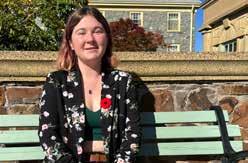
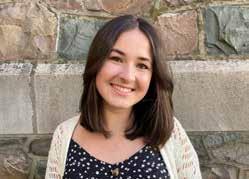
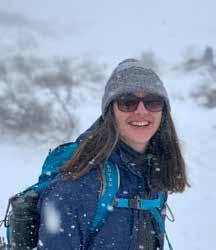
“It’s like skipping stones across the humanities pond. You touch on everything and deep dive with particular texts, ending up with a taste for what you really like. It’s ideal in that your first year isn’t spent in individual classes you don’t end up liking. And it’s so great to be with a group of like-minded people.”
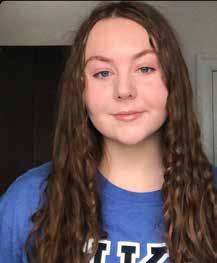
The Carrie and Ralph Wright Memorial Scholarship was established by Judith Kaye Wright, BA’64, in honour of her parents. This four-year renewable award is valued at up to $39,000.
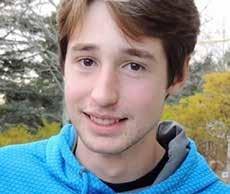
Hayley Carroll is a FYP Journalism student and the 2022 Carrie and Ralph Wright Scholar. When King’s called to tell her she had been selected for the scholarship, she almost ignored the call from an unfamiliar number. When she realized it was the university’s vice president on the line—and why she was calling—she was speechless.
“I tried to maintain my cool. I think I said, ‘Oh, that’s awesome. Thank you.’ And not much else,” she says. “Then I got off the phone, did some jumping around, ran upstairs to my sister’s room and told her. She sat in bed, and I jumped around some more.”
The Harrison McCain Foundation Scholarship carries a value of $16,000 over four years. This year, five McCain Scholars are studying at King’s, including two first-year students.
When first-year Bachelor of Journalism (Honours) student Linnaea Oland found out she was selected for the McCain Scholarship, she was working at a Tim Hortons back home in Cape Breton, N.S.

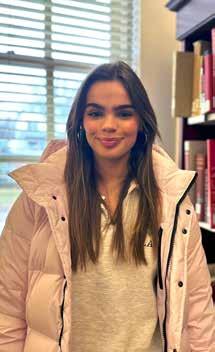
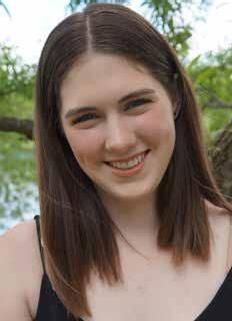
“I just started jumping up and down, and [my boss and coworkers] were all pretty excited for me … It meant and means a ridiculous amount to have won the scholarship.”
Oland hopes to continue fostering her lifelong love of writing and investigative storytelling through King’s journalism program. She points to independent news organization Al Jazeera as an example of somewhere she’d love to work.
Fellow first-year Bachelor of Journalism (Honours) student Jude Peplar hopes to build a career in journalism on one of his two loves: film and basketball. It was Peplar’s high school basketball coach who told him about King’s. “I grew up playing basketball, and that’s how I found out about King’s … (my coach) had actually been at King’s for journalism, so he recommended it to me. I made it my goal throughout junior high and high school to try and get there.”
Though he’s not sure what type of journalism he’ll settle on, he knows what
he wants to achieve: “I’m definitely looking to grow,” he says. “I definitely want to hone more of a voice for myself so that I can create more opportunities and people want to come back to (my) writing … I’d like to have some kind of distinct voice that people want to listen to.”
In 2022 King’s and Global News announced the Global News Scholarship. Valued at up to $12,000 over four years, the scholarship was created for a Black student entering the Bachelor of Journalism (Honours) program in September 2022, and is the second scholarship funded by Global News to support Black students in the School of Journalism, Writing & Publishing. First-year Foundation Year Program (Journalism) student Emily Conohan was selected for the scholarship, which includes a mentorship component.
Conohan developed a sharp eye early on. “When I was around 10 years old, my grandfather always had a lot of newspapers. I would come home after school and just sit on the floor and read [them],” she recalls fondly. “And he always thought it was funny, because I would highlight any errors, any writing mistakes I could find.”
Conohan looks forward to the opportunity to work with a mentor.
“I would be so honoured to learn from someone firsthand on how to navigate the industry. It would be so nice to have a role model, or someone who can help me with my career aspirations.”
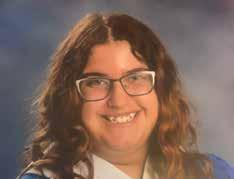
Named after celebrated Nova Scotian broadcast journalist and author Dr. Carrie Best, DCL’92, this renewable entrance scholarship, worth up to $20,000 is open to Black and Indigenous students.
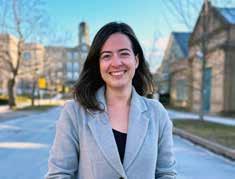
As the 2022 Dr. Carrie Best Scholar, Caleb Rennie joins two other King’s students who hold this prestigious scholarship. Rennie says he was first drawn to King’s for its close-knit community. Originally from Ajax, Ont., Rennie is a talented basketball player; after high school he spent a year in Cleveland, Ohio, at the International Sports Academy.
“I met a number of coaches from different universities, and I was considering things,” he explains. “Then King’s came along, and I saw what life would be like there. I really fell in love with it, the campus, how the coaches are and how the team is. It felt like the coaches and the school as a whole cared about me as a person—it was not just about basketball. I felt that King’s could be a second home for me.”
Rennie is making the most of his first year at King’s—he’s one of the few first-year students on the Blue Devils basketball team.

Named in honour of renowned filmmaker, writer, journalist and artist University of King’s College Inglis Professor Sylvia D. Hamilton, this renewable award is open to African Canadian students and worth $2,020 per year—an amount that reflects the year of Hamilton’s retirement from King’s.
First-year student and Blue Devils men’s basketball player Caleb Rennie is one of five King’s students who hold Sylvia D. Hamilton Awards.
“I am proud and humbled to have received this award. It has been my goal for a long time to earn a university degree and to find a way to let that goal involve basketball,” says Rennie who is also a Dr. Carrie Best Scholar. “The award is helping me make that dream a reality.”
Fellow first-year Sylvia D. Hamilton Award recipient Jonah Sisco is pursuing a Bachelor of Science. Sisco just finished an exhilarating first season playing defense on the men’s soccer team.
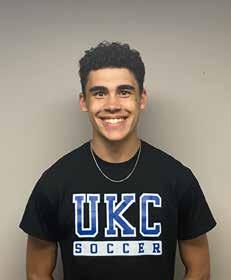
Receiving the Sylvia D. Hamilton Award, he says, has helped him focus on taking a full courseload of challenging but interesting first-year courses, including an African Nova Scotian Studies course. “My dad was excited I’m taking it because his side of the family is from Nova Scotia.”
Valued at up to $24,000, the Prince Scholarship is awarded annually to African Nova Scotian students entering the Foundation Year Program.
Journalism came onto 2022 Prince Scholar Micah Mendes’ radar when she attended a J-School Noire event in high school. Sponsored by King’s, J-School Noire is hosted by the Canadian Association of Black Journalists annually to introduce Black youth to journalism and encourage them to pursue a career in the field. In addition to the university’s journalism program, Mendes says King’s community atmosphere attracted them. “I like the people I have my classes with—they’re all really friendly and helpful and inclusive … just knowing that I have these people that are so willing to help someone they just met a couple of months ago makes me really happy.”
Created in 2020, each year the River Philip Foundation Journalism Scholarship (formerly the John and Judy Bragg Family Foundation) awards $6,000 to a journalism student.
The 2022 recipient is first-year Master of Journalism student Catherine Morasse. Before coming to King’s, Morasse gained solid experience over eight years at media organizations including Ottawa and Gatineau weekly papers, at Le Droit and Radio-Canada.
“I was thrilled,” she says, recalling the moment she was awarded the scholarship. “When you’ve been on your own financially, working and studying … well, it will make a huge difference!”
“I WOULD LOVE TO SEE KING’S on the map as a university of choice for people with disabilities,” says Michelle Mahoney.
Like most of the university’s employees, Mahoney’s daily journey to the office takes her through campus. Unlike most employees, she is paying close attention to her surrounding environment along the way— noting which doors, buttons, pathways and fire alarms are inaccessible for people with mobility issues. It’s her job to look at King’s from this perspective—Mahoney is the university’s first full-time Accessibility Officer.
“It’s a very old university with such great architecture, it’s such a beautiful campus,” she says. “And you can’t retrofit every single room of every single building on campus, but what you can do is make some entrances accessible. You can make different floors accessible, you can make residences accessible, you can make classrooms accessible … that’s what I’m here to do.”
The university has committed to offer an accessible campus by 2030 in accordance with Nova Scotia’s 2017 Accessibility Act. Mahoney will guide and support the implementation of King’s Accessibility Plan, ensuring the university meets relevant standards and stays on track. Her priorities include ensuring the university’s students get the full benefit of King’s and Dalhousie’s shared Student Accessibility Centre and helping make the campus as physically accessible as possible. “I am so excited to be living my dream of working in accessibility,”
Mahoney says with a smile.
Mahoney brings significant professional experience with Nova Scotia’s postsecondary landscape to King’s: she worked at Dalhousie for 23 years in various administrative positions. She also retains vivid memories of what it was like to navigate accessibility barriers as a student.
Mahoney was born with Arthrogryposis, a condition which affects the mobility of a person’s muscle joints. When she was born, she was the third known case in the province. She grew up in Springhill, N.S. and attended St. Francis Xavier University.
“When I speak to people, I say that I graduated in May 1995 with what I like to refer to as a ‘Bachelor of Arts with a Major in Independence,’” she says. “I went to St. FX and I’m very, very proud of earning a degree. I have an X-Ring and I’m very proud that I was able to accomplish something that people may not have even thought I would have been able to do.”
From a young age, Mahoney was taught to advocate for herself. She credits this and her success to her supportive family, her mother especially.
The transition from her family helping her with everyday tasks to living on her own was difficult at first. But she knew she had no choice but to learn.
“And you know what I did? I figured it out…. I graduated with my independence. When I first went to university, there wasn’t a lot I could do for myself. And when I grad-
uated, I could do everything for myself. So that, to me, is my degree. Nobody can ever take that away from me.”
St. FX worked to accommodate her— giving her extra time on tests and installing user-friendly door handles in her dorm. But navigating an institution not built for those with physical disabilities was still challenging and few supports were available. She’s delighted to be a part of that change for present-day students.
Outside of work, Mahoney is an active volunteer. She is involved with Easter Seals, a charitable organization working to enhance the lives and opportunities of those with disabilities: she sits on the Board of Directors for Easter Seals Nova Scotia and is the N.S. representative for the Easter Seals Board of Canada. She was honoured with the Queen’s Platinum Jubilee Pin and Medal (pg. 21) for her advocacy work.
She also admits to being a bit of an “adrenaline junkie”: she enjoys downhill skiing and in the summer she water-skis and surfs, taking advantage of Nova Scotia’s numerous parasport programs. She even rappelled down the side of the tallest building in Halifax as part of a fundraiser for Easter Seals.
“[Mahoney] is incredibly friendly and approachable,” says President William Lahey. “She will not only add to this community by being Accessibility Officer, but also by being yet one more member of the community who truly cares for people and is
motivated by the opportunity to make things better for other people living with disabilities and really everyone in the community as we move to embed accessibility into everything we do….”
Mahoney has already embarked on making changes. In her first week, she walked through campus and evaluated all the automatic doors, timing how long they stayed open and how easy it was to open them. She identified places on the sidewalk that flood when it rains, knowing even these little changes make a big impact for people with disabilities.
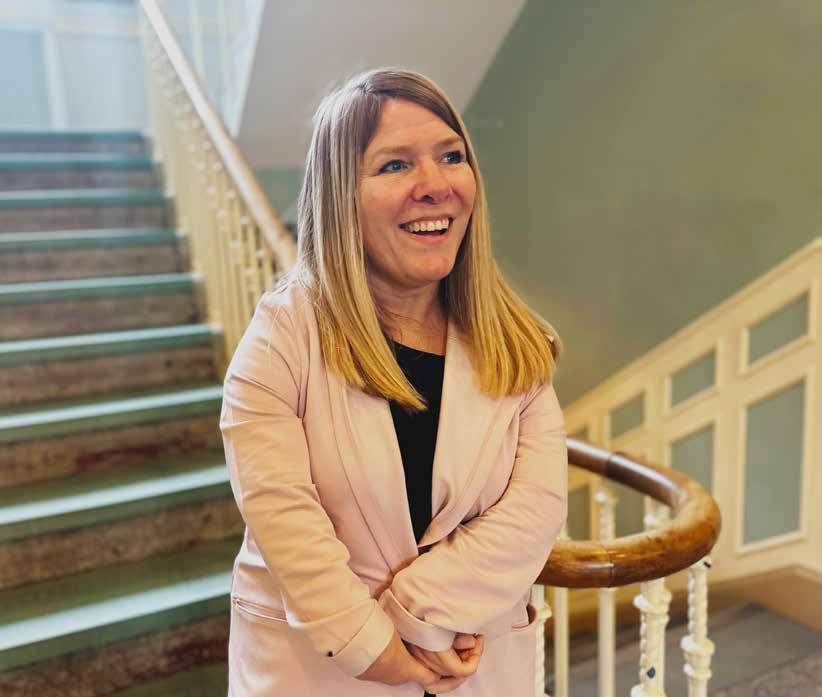
She points out that not everyone who requires accommodation was born with a disability. “People who acquire a disability, new mothers with strollers,” she adds.
“Unfortunately, sometimes people may not see [barriers] until they directly affect them. Snow on a sidewalk, curbs set at different levels … there are barriers every single day. If you can fix a few things, then that’s better than it was, right?”
When asked what she would like the biggest takeaway about her new position to be, she pauses and thinks for a moment.
“People with disabilities are people,” she says. “We’re all people first, we all have needs and wants and goals. And for people with disabilities, they might just need a little bit of help to get to their end goal. But you know, we’re all people. We’re all here for a reason. And I think that I just want to help people to get to that goal.”
We’re all people first, we all have needs and wants and goals. And for people with disabilities, they might just need a little bit of help to get to their end goal.

Four faculty reflect on the program’s 50-year development and imagine the FYP class of 2073
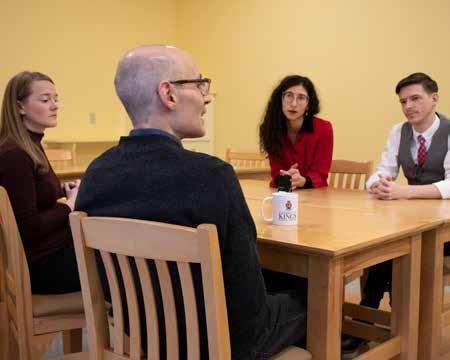
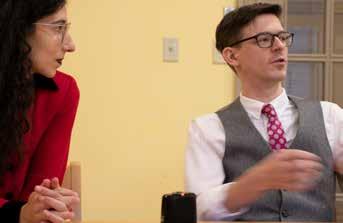
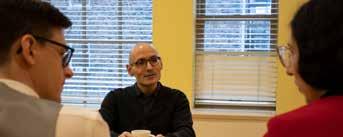
Since its inception, FYP has guided thousands of students on a unique journey through time, history and place. This yearlong process of intellectual exploration is one that FYP Director Dr. Daniel Brandes calls “imaginative wandering.”
How does FYP transcend the sum of its parts and spark that journey year after year, in student after student?
To find out, we sat down for a discussion with four members of FYP faculty, including three program alumni. We also asked them about the next 50 years: what challenges and opportunities do they foresee? The conversation, edited for length and clarity, took place January 6, 2023, with faculty Director Brandes, ’90; Assistant Professor Tim Clarke; Faculty Fellow Catherine Fullarton, BA(Hons)’10; and Associate FYP Director (Academic) Hilary Ilkay, BA(Hons)’13
What would you say the Foundation Year Program (FYP) aims to teach students? And do you think that this is changing with time?
DANIEL BRANDES: There’s no one single thing that FYP aims to teach students.… One of the things the program does that’s most important to me is to cultivate the power of imagination in our students. One of our aims in having them read texts that are far away in time and place from themselves, is to help them ‘wander imaginatively’ across time and space, which is a talent that will become, I think, increasingly important for citizens of the contemporary world.…
To cultivate this power of ‘imaginative wandering,’ for me, is one of the central achievements of the program.
TIM CLARKE: I always think of (part of) what we’re trying to teach as a kind of intellectual autonomy. We expect a lot of our students and it’s a demanding program in a lot of ways: in terms of reading load, in terms of writing load. But part of what that experience is about is guiding them towards the point where they know themselves intellectually, they know their capabilities, they know what makes them curious, they know the directions that they want to go in. So, I think that … facilitated ‘wandering’ is an important part of the classroom.
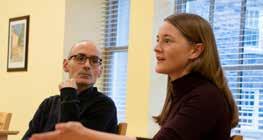
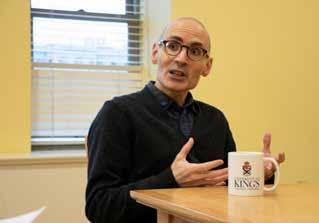
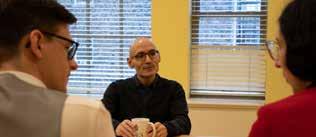
HILARY ILKAY: I think one of the values is that we don’t create this echo chamber that’s so easily perpetuated due to the online world: we force them off the screen and off of these curated internet spaces and say, ‘What if you read this book from 3,000 years ago, 300 years ago, three years ago?’ and, ‘How can you interact with those texts in a respectful way, in a generous way, even if you don’t agree?…’
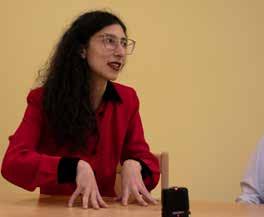

While FYP’s book list evolves each year, the structure of the program—students are assigned texts to read, they attend lectures on those texts, followed by small group tutorials and they’re assigned an essay every two weeks—has remained largely intact since the program’s beginning. What do you think it is about that structure that makes it so enduring?
BRANDES: In my view, the program stands or falls with the tutorials. It’s the heart of the program….
There were certain brilliant moves made at the very beginning by the founders of the program: for instance, the insistence that students stay together over the course of the year, and that they don’t switch up tutorials. I think that’s enormously important; it helps our students feel confident expressing their opinions over the course of the year because they feel at home with the other students in the tutorial.
CLARKE: I think part of what’s so useful about that set-up, is the contrast between the lecture and the tutorial…. You often have students working through their feelings about the lectures in tutorial … It’s really gratifying to see them shift in their shoes a little bit over the course of a tutorial, and you see them coming to terms with material.
It models for them (I think in a really effective way) that you have the text, and the text is an object of its own. But then anything you say about the text is an interpretation. And you have to build that on something…. And that’s not something that’s self-evident to them always, before they get to FYP.
CATHERINE FULLARTON: I know that writing a paper every other week is a big challenge for a number of students … But I really see the value for students in having opportunities, not only to practice a skill on a regular basis and to make it a habit, but also … to try new things and to take risks…. With so many opportunities to try, get feedback and try again, students can take risks and even do poorly on a paper and recover in a way that they just can’t in other programs or courses.
Especially in first year, it’s incredibly valuable to have the pedagogical stakes set up in that way….
FYP is based on the study of primary sources, and the program helps students to form and articulate their own thoughts on the works studied. In the 50 years since FYP launched, the world has entered what some call the Information Age, defined by Merriam Webster as ‘a time in which information has become a commodity that is quickly and widely disseminated and easily available, especially through the use of computer technology.’
Given the changes to the way we access and consume culture and information today, do you think that it means something different to teach primary sources now than it did in the early days of the program?
CLARKE: … I think in some ways, that’s just an exaggeration of a problem that’s always been there. You know, you’re always grappling with what students bring and don’t bring to the text in front of them. So it has its challenges, but I think they’re ones that responsible teaching already … attempts to address. It means that sometimes they’re seemingly surprisingly widely read about certain things that I would never have been at their age, but sometimes that’s helpful and sometimes it’s not.
ILKAY: … I think that to do FYP well actually requires a kind of unplugging. And that’s really valuable for students who now have phones, computers, whatever, where they can constantly be online and plugged in. But to actually give them physical books, I think, is also something that the program keeps doing—and needs to keep doing.
To say, ‘Here’s a stack of books you have to get through, and to do well in this program is going to require you to sit with these books and get off the screen. And you’re going to have to, in a tactile way, engage with the material, use a pencil, underline, write notes in it.’ Actually reading, close reading, in that way, is the only way to get a lot out of the program.
Alumni have sometimes said FYP helped them to develop an awareness of continuity with the past. For example, that the problems that affected people centuries ago have much in common with the problems we face today. Do you think that today’s FYP students still feel that continuity?
BRANDES: I do not. And I actually think there’s a healthy disagreement amongst faculty on this question of how to understand the relationship of our contemporary readers—the students in our program—to the tradition.
One model is to think of what we’re doing in terms of belonging. So the students are meant to understand that they are where they are on account of the tradition that’s come before, they are part of this tradition that is unfolding and the aim of the program is to help them understand their belonging to the tradition.
But that model excludes the possibility of a different model, or it stands in some tension with it, which is a model where they see themselves not as seamlessly belonging to an unfolding tradition, but as threatened by the tradition, or in some important respect, at odds with the tradition. But how should we articulate their relationship to the tradition if it’s not one of seamless continuity? How should we frame this discontinuity? And that’s where there are disagreements. I think most people think that there needs to be room for a thinking of discontinuity. The question is how to understand that….
FULLARTON: The metaphor that I’ve been thinking about lately is of kinship and inheritance: I think students come in curious
about these great books, because they feel like, in a sense, they’re the newest generation of a long history, and they’re curious about how we got here, what came before, what are these ideas and questions that people have been discussing for so long and return to again and again.
And that relationship is fraught, in the way that many inheritance relationships are, which is to say: in an inheritance, you don’t know what you’re getting or what the responsibility of that ownership is … and you have to figure all of that out as you go….
I think of it … as a relationship of discovery and renegotiation. And I think that clarifying that relationship for oneself can be exciting, challenging and sometimes troubling.
ILKAY: I personally struggle in a productive and interesting way, teaching in a program like this, because the tradition that I’m teaching is not mine, it’s not my family’s. So, I feel removed from it in a way; I did as a student, too, which was neat, it gave me a really cool perspective on the program.
As a first-generation Canadian, as a first-generation university student in my family … I felt sort of, ‘Do I belong here? How do I think about these things? Everyone else seems so comfortable with this material, they all know these names; I don’t know any of these names; my parents have never heard of these people.’ And that’s something that I still reckon with teaching in the program….
I think reading from that place is actually helpful, and it has been quite generative for me. But I want to help students get there, too. How can you stand outside of … a tradition that you see as yours? And what does that allow you to see that you might have been blind to if you were just stood in the middle of it? I love teaching the syllabus. I love seeing it develop every year, but I do have a fraught relationship with it, just based on my own background.
How can you interact with those texts in a respectful way, in a generous way, even if you don’t agree?

Fifty years, fifty book lists. No textbooks. Thousands of papers, thousands of students. No bad questions. Countless debates, countless journeys. No limit to where it can take you.
Each year from 1972 to 2022, the King’s community has welcomed a new Foundation Year Program (FYP) cohort. A year-long journey of critical investigations of texts conducted through tutorials, arguments and essays, FYP is credited by many program alumni with teaching them to think critically and write persuasively. From Dante to Darwin, from Voltaire to Césaire, the book list may evolve and change but the premise remains the same: students form their own understanding of a work by reading the text itself, by attending lectures about the work and through thoughtful discussion with peers and faculty.

Join us as the celebrations continue!
Stay tuned for information about the Fifty Years of FYP book launch this spring!
Test your knowledge and join us for FYP Trivia on April 3 at 7 p.m. in the Wardroom on campus! Can’t make it in person? Watch along from home with the livestream (channel Jeopardy! and shout your answers at the screen!)
From June 2–4, 2023, Alumni Day joins Fifty Years of FYP for festivities that will last all weekend! The recipients of the 2023 Alumni Awards will be announced and celebrated, alongside 2020 winners who we were unable to award in person due to the pandemic. Catch up with friends old and new and reserve your room in residence to spend a full weekend back on the Quad!
HIGHLIGHTS INCLUDE:
• Kick-off Friday evening in the Wardroom
• Alumni brunch
• A special Foundation Year Program lecture
Register to attend, book a room in residence and join the party! Visit: ukings.ca/alumniday
SINCE ITS INAUGURAL YEAR in 1972, the Foundation Year Program (FYP) at King’s has been the gateway to academia for countless students. Now in its fiftieth running year, the program at the heart of the King’s community is running a series of events to celebrate, Fifty Years of FYP. As the opening act in this series, Dr. Ron Haflidson, BA(Hons)’04, returned to the FYP podium on November 9, 2022, to deliver a lecture on ostriches in the Book of Job. As FYP Director Daniel Brandes, ’90, put it, the niche topic demonstrated an exemplary close reading of a passage of text, worthy of a FYP great like Haflidson.
The atmosphere of the evening carried a sense of homecoming. A graduate of the program as well as a former FYP tutor, Haflidson opened his lecture with an exploration of the place FYP has held in his life. Having participated in FYP six times, he has spent, by his count, more time in FYP lectures than in the shower, more years in FYP than in junior high and has attended more general tutorials than weddings, funerals, bat mitz-
vahs and bar mitzvahs combined. Standing behind the Alumni Hall podium, Haflidson did something perhaps as routine to him as any of the activities he listed. To the room of excited listeners, including many FYP alumni and faculty, he wove a captivating story about the sense of belonging FYP has generated for each cohort in its 50 years of existence.
The lecture topic, ostriches in the Book of Job, was immediately engaging by virtue of its uniqueness. The topic is, as Haflidson himself termed it, “quirky.” Ostriches, mentioned only twice in the Book of Job, are invoked when Job compares himself to the bird. Job feels a particular kind of anguish that sets him apart from his friends. He sees himself reflected in the ostrich and its mournful cries. Asking the question, “How is God addressing Job’s suffering?” Haflidson framed God’s answer to Job as a reminder that Job’s suffering may be obscuring his perception of the world. For God, the cries of the ostriches are joyful.
Ultimately, Haflidson provided Biblical
interpretation that was less “quirky” than it may have originally seemed. What emerged from his reading of the text was a story about how God perceives His own creation, finding glory even in an odd bird like the ostrich. To close out the lecture, Haflidson drew a connection with queer theory. In the sense of queer meaning strange or weird, the ostrich is certainly a queer bird. They have also been known to pursue same-sex courtship in the wild. Ostriches aren’t mentioned in Genesis, but in the Book of Job God speaks about them directly. If there is an ostrich gap in Genesis, Haflidson argued, then there may also be a queer gap. In the range of Creation, there is room for the particular excellence of the ostrich, and for queer people as well.
Following the lecture’s conclusion, tutorial groups gathered to discuss the themes and ideas of the evening. This writer was placed in a tutorial with some of my fellow FYP alumni as well as current FYP Tutor Dr. Michelle Wilband and former Contemporary Studies Program Professor Dr. Elizabeth
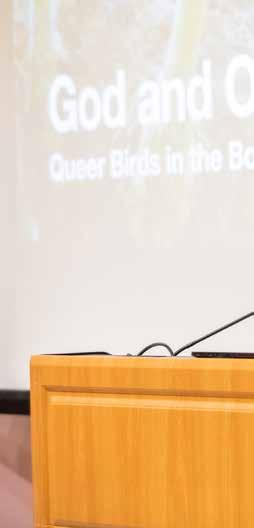
Edwards. The insights of faculty and alumni made it a stimulating tutorial discussion. Having been part of the FYP cohort who completed the program entirely online in 2020-21, I am happy to report that my first in-person FYP tutorial was a complete success. It was a particularly special experience thanks to the engaging nature of the lecture, and the excellent company of Professors Wilband and Edwards. The tutorial was not only a delightful experience in keeping with FYP tradition, but it also had a personal impact. It allowed me to put a name to the feeling of homecoming that had pervaded the evening—the experience that many in attendance shared, joining Haflidson in coming home to FYP.
Emma Martel is a third-year Bachelor of Arts student taking a Combined Honours in Early Modern Studies and Religious Studies, with a Minor in the History of Science and Technology and the Certificate in Medical Humanities. Photo by Kelly Clark.
KING’S FOUNDATION YEAR Programme (FYP) has had to cope with two Internet Revolutions in its time. At the end of its 1st Quarter Century, FYP learned to adjust to the world of the Web Browser—early successes were Mosaic (1993) and Netscape Navigator (initial release in December 1994). Google was incorporated around the 25-year mark (in September of 1998), and then Wikipedia provided its first Internet content in January 2001 [Source: Wikipedia!]—so those “tools” first appeared around the time of FYP’s “half-life”.
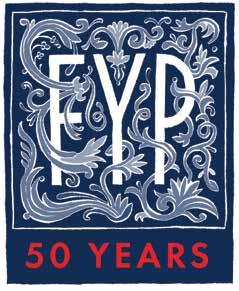
Now as we stand at the conclusion of FYP’s second quarter century, we are witnessing the next AI (Artificial Intelligence) “revolution in consciousness”. Microsoft (MS) has its usual part to play here: having acquired a controlling interest in OpenAI (of which Elon Musk was a founding member), MS is anticipating that OpenAI’s release—on the last day of November, 2022—of the third iteration of ChatGPT (hereafter Chat3) will provide a huge advance in its quest for world domination. By its aligning of Chat3 with MS’s Bing Search Engine, MS anticipates putting a huge dent into Google’s nearly 84% share of the global “search engine” activity. MS’s Bing—so far—has only managed
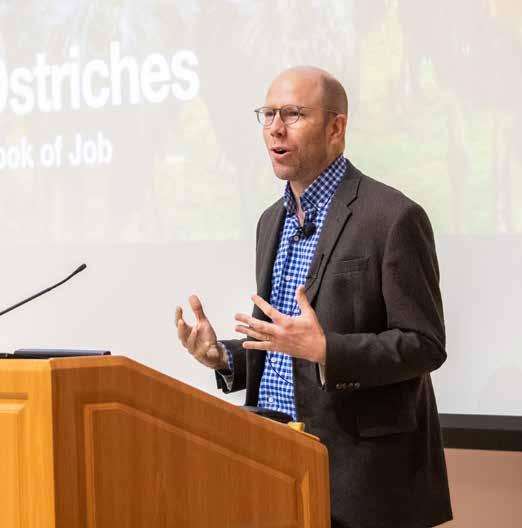
What emerged from his reading of the text was a story about how God perceives His own creation, finding glory even in an odd bird like the ostrich.
to climb up towards 9% of the market.
MS is not being unfairly singled out in these remarks, by the way. It is MS itself that has flung down the gauntlet. As MS Chief Executive Satya Nadella has explained: “Search is the most profitable category on planet Earth”—by which he appears to be suggesting that Internet “browsing and searching” has a capacity for growth and revenue on a scale that is both incalculable and really without limit. The vocabularies that have accompanied the launch of Chat3 are almost apocalyptic in tone. A significant Silicon Valley analyst (Matt Bornstein), echoing Microsoft’s Nadella, has suggested: “The potential size of this market is hard to grasp—somewhere between all software and all human endeavours.”
So exactly what is ChatGPT-3? Well the GPT stands for “Generative Pre-trained Transformer”—all clear? But a better place to start would be to allow Chat3 to introduce itself—which it has done in response to a user query; these are Chat3’s actual words— and they are presented with an admirable absence of jargon: “ChatGPT is a computer program that uses artificial intelligence (AI) to understand and respond to natural language text, just like a human would.”
While I am deeply charmed by Chat3’s apparent modesty, Chat3 is vastly more robust than this brief description suggests or allows: the reason that Chat3 needs to be discussed in the context of the future of FYP is that—among other talents: producing computer code, writing “poetry”, generating
music, and just simply “chatting”—Chat3 has already demonstrated its ability for “producing high-quality essays with minimal human input.”
And Chat3’s academic talents have not escaped the notice of stressed-out students coming up against an assignment deadline. Within just days of its launch on November 30th, a million petitioners had put Chat3 to the test. Within the first five weeks of its being made available, Chat3 had managed to acquire a staggering 100 million “users”— and of that number—now certainly hugely eclipsed, 30 million were logging on to Chat3 every single day. Nadella is probably right: Chat3—and Chat4 is already in the works for release in this calendar year—is something that is going to have an almost immediate transformative role on planet Earth.
But the most significant statistic for our attention in this issue of Tidings is that an initial survey already taken of 1,000 post-secondary students by intelligent.com: revealed that “nearly 1 in 3 have [already] used ChatGPT” for written assignments.
Co-founder Elon Musk has now severed his links with OpenAI (the parent of Chat3), because MS has acquired the controlling interest of OpenAI—and Musk has wondered how “Open” this AI will continue to be within this for-profit corporate behemoth. Musk’s original interest was in setting up an alternative to Google’s dominance. Whatever else happens, this ambition looks as if it will be realized.
This emphasis on Musk’s relation to the appearance of Chat3 is warranted, because Musk provided the pithiest possible response to Chat3’s launch. In a tweet of immense precision and concision, Musk announced: “Goodbye, homework.”
Our future has arrived: Chat3 has already amply demonstrated its ability to provide tailor-made, coherent and grammatical responses to essay-style questions in just about the same time it takes for the interlocuter to type the original question. And since Chat3 is having a conversation, Chat3 does not simply re-iterate answers produced from elsewhere: as in normal conversation, each response is in some sense original and unique.
My own most profound fear is that the sentences and paragraphs that Chat3 manages to spit out will not themselves be reproduced verbatim, but that the elegant summaries provided will prove to be templates for assigned work—which will then
only need a “wee” bit of reverse engineering by the inclusion of a smattering of footnotes, which have been identified by Old-Style Web searching, so as to add a hint of authenticity.
You see, the real issue is that Chat is not a link-provider in the style of Google, it is an information aggregator—having already absorbed (and ordered) billions of individual sources of information. And therefore Chat3’s facility in producing a coherent, grammatical, and even convincing summary, thus, potentially removes the necessity for any kind of original research—all that then remains is a little bit of cherry-picking of footnotes to mask the evidence of the essay’s origins in MS’s Deep Throat—oh, sorry, I meant the chess world’s Deep Thought!
Since I need to end on a jaunty note in reviewing FYP’s Half Century, I am able to suggest one ground for optimism. Whatever happens in the future, FYP may still have the capacity to impart that hint of jeu d’esprit which remains very far from the artifice of “virtual reality” and “enhanced reality.” How will the internet aggregator, I wonder, ever cope with Oscar Wilde’s assertion: “it is only a shallow person who does not judge by appearances”? Aggregation has to be coherent, and, at first sight, Wilde’s correct assertion appears to be nonsense, just because its sense is so profound. Perhaps Wilde defies aggregation, and so Wilde remains “doubly right”: after the Chat3 (Chat4!) revolution has worked its “spell” on us—perhaps that’s all we shall have left: that is to say “judging by appearances”!
NB: This discussion of ChatGPT-3 has been “ethically sourced” from the following publications: cnet.com, oltnews.com, Fortune, The Financial Times (London), The Guardian, The London Review of Books, The Sunday Times (London), The Telegraph (Calcutta), The Week (UK), & USA Today — and the Twitter Account of Sunil Vali (New Delhi).
Whatever happens in the future, FYP may still have the capacity to impart that hint of jeu d’esprit which remains very far from the artifice of “virtual reality” and “enhanced reality.”
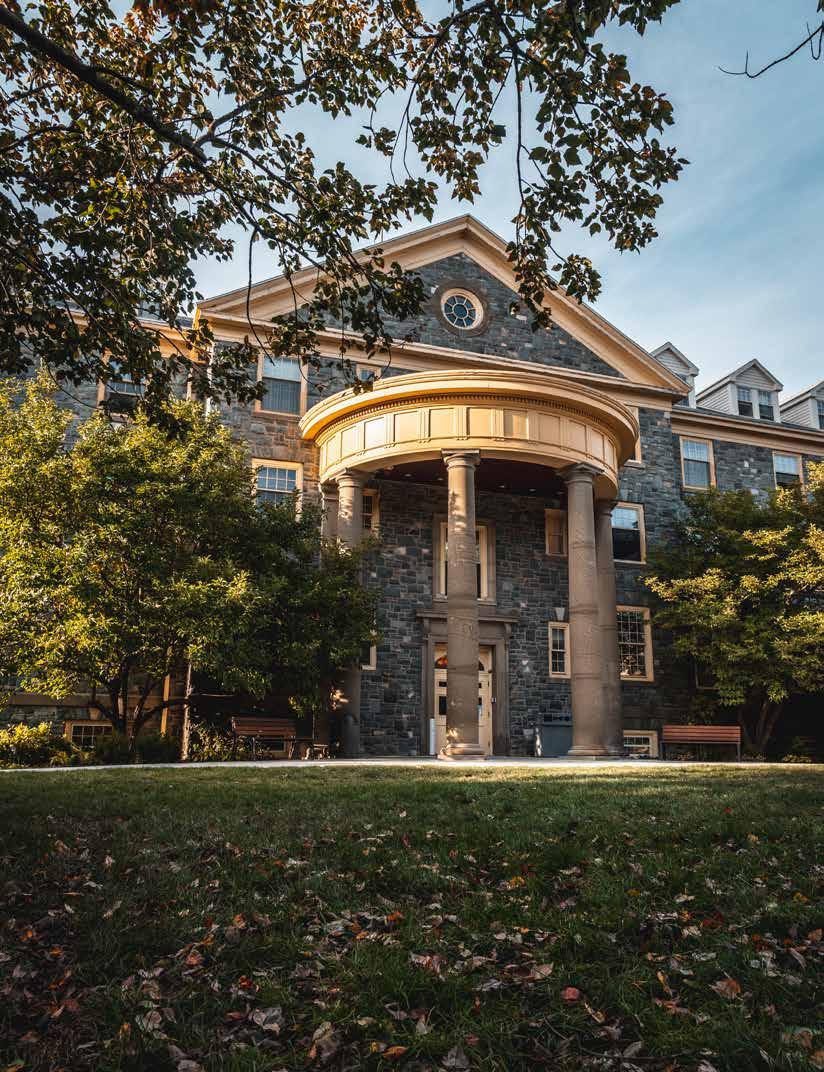
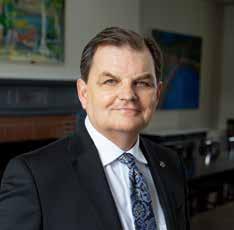
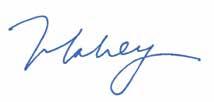
SINCE JOINING KING’S in 2016, I’ve taken great pleasure in opportunities to meet alumni—whether it be on the road, online or when they have an opportunity to return “home” to King’s campus. Unique to the latter is the joy of seeing a member of our alumni community take in their old stomping grounds as they are today: undoubtedly the same place, but just a little different. That experience reflects a balancing act that is, I believe, integral to the work of faculty and staff throughout the university: to ensure the education we offer and the environment it’s offered in reflects the needs of a twenty-first century community, while retaining the history, tradition and character that make King’s feel like home to generations of alumni.
It is a balance we strive to uphold daily and it’s one that so many of you are helping us to achieve, through significant generosity. In the fiscal year reported here, April 1, 2021–March 31, 2022, your gifts provided $566,000 in direct financial support to students. Your gifts also enabled King’s to upgrade a computer lab for journalism programs, in which they produce award-winning work (pg. 15)! We continue to develop some of the most innovative, boundary-breaking opportunities in experiential learning available at any university (pg. 7), opportunities funded by donors.
In other circumstances, your unrestricted giving helped level the playing field: former youth-in-care can now apply for a tuition waiver and this coming year, we’ll welcome the first students to take the Bachelor of Journalism (Honours) as part of the Mi’kmaw journalism cohort. The beautiful transformation of Alexandra Hall (pg. 68-69) into a residence that offers an accessible entrance elevator, rooms and bathrooms, is a major enhancement that was primarily funded by the university, to which some of your unrestricted gifts also flowed. The result, long overdue, is that we now welcome students to our residence community who we could not welcome to residence life before.
Not all of these developments are immediately evident from a walk around campus, but I believe they come through in the dynamism of the students. One example is McCall MacBain finalist Lucy Boyd (pg. 26). Lucy was nominated for this prestigious postgraduate scholarship for her thoughtful leadership in the King’s community and for the great potential the scholarship committee sees in her to make a big impact on the world. Undoubtedly, Lucy is a leader of her generation, yet at the same time the qualities for which she is being recognized evoke the spirit I have witnessed in so many students and alumni at King’s over the years.
To each of you—alumni, parents, faculty, staff and current students, too—who have supported our educational mission and helped us to “maintain the balance,” thank you. Your gifts help us preserve what is so special about King’s, even as we enhance it and make the university ready for the generations to come. With your continued support we are ready for the future.
With appreciation,
BillPlease note this report reflects donations made from April 1, 2021 to March 31, 2022. Donations made after this time will appear in next year’s Stewardship Report. Every effort has been made to list names accurately. If your name has been omitted or displayed incorrectly, please accept our apologies, and notify King’s Advancement Office, 6350 Coburg Road, Halifax, Nova Scotia B3H 2A1 or call (902) 4221271 ext. 128 or e-mail Paula.Johnson@ukings.ca.
Explaining the “King’s Crown.” The “blue crown” symbol marks all those donors who have contributed consecutively for the last five financial years and the “gold crown” symbol marks all those donors who have contributed consecutively for the last ten financial years. And there is an invisible “heart” symbol that marks all of you as King’s!
CHANCELLOR'S CIRCLE
($10,000 and over)
anonymous (1)
The Alpha Aquilae Foundation
Bell
BMO Financial Group
The John and Judy Bragg Family Foundation
Global News
Tom Eisenhauer
Larry Holman ∂
Susan Hunter ∂
Kathy (Pratt) LeGrow
Debra Deane Little & Robert Little
Oriel MacLennan
Estate of F.C. Manning* ∂
Harrison McCain Foundation ∂
Kim McCallum ∂
Wesley M Nicol Foundation ∂
Beverly (Zannotti) Postl ∂
RBC Foundation
UKC Alumni Association ∂
($5,000 to $9,999)
Acadia Broadcasting Corporation ∂
William Barker & Elizabeth
Church ∂
Patricia Chalmers ∂
Compass Group Canada ∂
George & Tia Cooper ∂
Thomas Curran & Kara Holm ∂
Fred & Elizabeth Fountain ∂
J. Roderick Fraser ∂
Laurie Hay & Douglas Kellar
Mary Janigan & Tom Kierans ∂
Peter Jelley ∂
William Lahey & Kathryn Lassaline ∂
Gillian McCain ∂
Donald Stevenson ∂
($2,000 to $4,999)
Judy Abraham
David & Robin Archibald ∂
Katrina Beach ∂
Black Family Foundation
Peter & Patricia Bryson ∂
Richard Buggeln
Gordon Cameron ∂
Hope Clement
Robert Dawson ∂
Lynne & Bob Delise
Drain Poultry Limited
Edmonds Landscape and Construction Services Ltd.
Christopher Elson ∂
Marion Fry ∂
Bruce Geddes
William & Anne Hepburn ∂
Michael Kishchuk
Laurelle LeVert ∂
John MacLeod
Rowland Marshall ∂
Anita McBride
Michael & Kelly Meighen ∂
J & W Murphy Foundation
Doug & Marlene Oxner ∂
Penguin Random House Canada
Estate of John Phillips*
Neil & Patricia Robertson
Douglas & Valerie (Morine) Ruck
Ronald Stevenson ∂
Sarah E. Stevenson ∂
PRESIDENT'S CIRCLE
($1,000 to $1,999)
anonymous (5)
The Hornbeck Family ∂
Shirley Bradshaw
Richard Brown
Brian Brownlee ∂
Paul Charlebois ∂
Sarah Clift
Chère Chapman & Gord Cooper
Barry Craig
Brian & Lindsay Cuthbertson ∂
Gwendolyn Davies ∂
Daniel de Munnik & Tasya
Tymczyszyn ∂
Catherine Foote & Arthur Frank ∂
Kevin & Carolyn Gibson ∂
John & Brenda Hartley ∂
Elizabeth Edwards & Ronald Huebert
Andrew & Patricia Laing ∂
Benjamin Langer
Arthur & Patsy LeBlanc
Stephen Lownie
John MacKay
Kenzie MacKinnon ∂
Michael & Cynthia (Edwards) MacMillan ∂
Jaqueline Matheson ∂
Elizabeth Miles ∂
Paul Mosey
Robert Muggah
Sandra Oxner
Stuart Pattillo
Mary Lu Redden
Miranda Spence
Gary Thorne
Thunder Selects Basketball
Fernald Wentzell
Hugh Wright ∂
Sharon Wynn & Peter Dauphinee
BENEFACTOR'S CIRCLE ($100 to $999)
anonymous (25)
3299196 Nova Scotia Limited
Adriane Abbott ∂
George Abbott
John Adams
Bob Allison ∂
AMC Chartered Professional Accountants Inc.
Matthew Aronson
Lorraine Atherton
Nathalie Atkinson
B&F Electrical Ltd.
Kathleen Bain
David Baker
Jane Baldwin ∂
Paul Baldwin ∂
Jennifer Balfour ∂
Mary Barker & Ron Gilkie ∂
Roberta Barker ∂
Keith Barrett ∂
T. Frederick Baxter
Celine Beland
Jennifer Mary Bell
Oliver & Carrie Bendzsa
Matthew Bernstein & Risa Prenick ∂
Gilbert Berringer ∂
Julie Bertrand
Myra Bloom ∂
Stephen Bowman & Elizabeth Koester ∂
Daniel Brandes & Dawn Tracey Brandes ∂
Lauren Brodie ∂
Rebecca (Moore) Brown ∂
Sharon Brown
Christophe Brzezinski & Agata Brzezinski
Mordy Bubis & Nina Stipich ∂
Kimberly Burnett-Levy & David Levy
Melissa & Jeff Burroughs
David Cadogan ∂
George Caines ∂
Lloyd & Nicola Campbell
Nancy Campbell ∂
Roland & Nicole Canning
Howard Cappell
Eugene Carew
Jackie Carlos & Colin Soule
John Carr ∂
John Casken
Ziyad & Renee Chediac
Carolyn (Tanner) Chenhall ∂
Fred Christie ∂
Joan Christie
Ian Chunn & Susan Reaney ∂
Burdette Coates ∂
Charlotte (Graven) Cochran
Peter Coffin ∂
Thomas Coonan ∂
Monique Couture
Mary Craig
Robert Craig ∂
Richard & Marilyn (McNutt) Cregan ∂
Tim Currie & Christina Harnett ∂
Ronald Cutler ∂
Audrey Danaher & Richard Heystee ∂
Sally Danto
Ken Dauphinee ∂
Susan Davies ∂
Wendy Davis ∂
Joan Dawson ∂
Edward Day
Ken Dekker ∂
Douglas Deruchie
Michelle Deruchie ∂
Mary (Coffill) Deveau
Fraser Dewis* & Marilyn (Lingley) Dewis
J. Mark & Rachel (Swetnam) DeWolf ∂
Jackie Digout
Sarah Dingle & Carl Lem ∂
Blair Dixon
Pat Dixon
Susan Dodd ∂
Stephanie Duchon ∂
Mark Duggan
Terra-Lee Duncan
David Dunn Limited
Leslie Dyon
Diocesan Synod of Fredericton ∂
Elizabeth Edwards & Ronald Huebert ∂
Keith Egger & Tracy Summerville
Greg Elmer
Howard Epstein
Stephen Farley & Sarah DuBeau-Farley
Jim Feir ∂
Graham Flack
David Fletcher
Phillip Fleury ∂
Victoria Foley
Susan Folkins ∂
Alexander & Stacey (MacDonald) Forbes ∂
Brenda & Robert Franklin
Linda & Gregor Fraser
Nevin French
William Fyfe
Jim & Sally Garner
Edward Gesner ∂
Clare Gibbons
Dorota Glowacka ∂
Dr. John F. Godfrey
John Gorrill ∂
Andrew Graham ∂
Nicholas Graham ∂
Nita H. Graham
Barbara Grant
David Gray ∂
Jennifer Gray
Howard Green & Lynne Heller
Roselle Green ∂
Vanessa Green
Anne Gregory
Joanna Grossman ∂
Gregory Guy ∂
Sylvia Hamilton & Bev Greenlaw
Elizabeth Hanton ∂
Gaye Harden ∂
Andy & Anne (Dorey) Hare ∂
Carla & Steve Harle ∂
Peter Harris ∂
Susan Harris ∂
C. William Hayward* ∂
Elizabeth Hayward
David Hazen
Douglas Hazen ∂
Harold Hazen*
Mark & Shirley (Wall) Hazen ∂
Alan Hebb* ∂
David Henry
Wendy Hepburn
David Herbert ∂
Shelley Hewins
John Hobday ∂
Pamela Holmes
Neil Hooper ∂
Dennis & Doris House
James Howison
Michaela Huard ∂
Caroline (Bennet) Hubbard
Haynes & Susan (White)
Hubbard
Ian & Catherine Hugill
Robert Hulse
Dennis Hurlburt
Robert Hyslop ∂
Erin Iles ∂
Ranall & Sherry Ingalls
Matthew Irwin
Alan Levine & Iris Jacobson ∂
Rhonda Jansen & Brad Faught
Ian Johnson ∂
Paula Johnson ∂
Sarah Jones
Ben Kates ∂
Janet Kawchuk ∂
Doreen Kays ∂
Mary (Lewis) Kennedy ∂
Glen & Glenda (Cummings)
Kent ∂
Kim Kierans ∂
Stephen Kimber ∂
W. J. Tory & Margaret (von Maltzahn) Kirby
Stephen Knowles ∂
Phil Kretzmar & Kaarina Baker
Kelly Laurence
Caleb Lawrence ∂
Joanne Leatch
Thomas & Barbara (Aikman)
LeBrun
Thomas Ledwell ∂
John* & Nancy Leefe ∂
Amanda Leslie
T.C. Leung ∂
Ruth Loomer ∂
Bill & Stella Lord ∂
Iain R.M. Luke ∂
Andy Lynch
Casey Lynch
Margaret Lynch
Christina Macdonald ∂
The friends of Captain Richard
MacDougall
Elaine & Ian MacInnis
Ken & Mary MacInnis ∂
David Mackay ∂
John MacKenzie ∂
Judith MacKenzie
Lina (McLean) MacKinnon ∂
George MacLean
John MacLean ∂
Stephen & Julianne (Doucet) MacLean ∂
Russell MacLellan
Rod & Robin MacLennan ∂
Jennifer (Bassett) MacLeod
Judy (Oxley) MacLeod
Marli MacNeil ∂
Heather MacQuarrie
Adrienne Malloy
James Mann ∂
Heather May ∂
Andrea McBride
Alexandra McCann
Molly McCarron
Frances (Smith) McConnell ∂
Anne (Wainwright) McGaughey
McInnes Cooper ∂
Ian & Johanne (Zwicker) McKee
Alan McLeod
Elizabeth McNeil ∂
David Mercer ∂
Joyce (Blandford) Millman
Catherine (Rhymes) Misener ∂
Simone Pink & Doug Mitchell ∂
Janet Mitchell ∂
Penny Moody-Corbett
Jane Adams Ritcey & Wilfred Moore
Kathryn Morris
Brendan Morrison ∂
Joan Morrison ∂
Stephen Murray ∂
Diane Murray Barker
David Myles ∂
Peter Nathanson ∂
Ardis Nelson
Andrea Nemetz
Richard Newman
Jan Nicholls & Paul Sobanski ∂
Fred Nicholson
Theresa (Nowlan) Suart
Peter O’Brien
Ocean Contractors
Richard Oland
Anne O’Neil ∂
Charles O’Neil
Maggie O’Riordan-Ross ∂
Fran Ornstein ∂
Marco Oved
Sandra (Munroe) Oxner
John Page
Owen & Elizabeth (MacDonald) Parkhouse
Kevin Pask ∂
Kelly Patterson & Peter Buckley ∂
Anne & Pays Payson
Charlotte (MacLean) Peach ∂
LeRoy Peach ∂
Dana Peebles
Sandra Penney ∂
Arthur & Elizabeth (Baert) Peters
Robert Petite ∂
Dennis Phillips
Cynthia (Smith) Pilichos ∂
Ann Pituley ∂
Ellery Platts
Rob Platts & Rachel Syme ∂
David Pond
Lori Pope
Elizabeth Murray & Gary Powell ∂
Helen Powell ∂
Morton & Joanna Prager ∂
Victoria Prostak
Margo Pullen Sly ∂
Christina Quelch ∂
Angela Rae
Irene Randall ∂
Susan (McCulloch) Richardson
Tim Rissesco
Patrick Rivest ∂
David Roach & Alex Schofield
Eve Roberts
Maria Roberts
Colin Robertson
Paul Robinson & Ann Surprenant
Sheila (Fenton) Robinson ∂
Henry Roper ∂
David Rose
Michael Rudderham
Rutledge Arms Construction
Limited
Elizabeth Ryan ∂
Helen Anne Ryding
Mike Sampson ∂
Bonnie Sands ∂
Stuart Schwartz
Aden Seaton & Howard Krongold ∂
Shelley Shea ∂
William Sherren
Karen Shewbridge & Bretton Loney
Taylor Simon
John Simons
Patricia Simpson & Kim Read
Lynda Singer ∂
Katharine Sircom ∂
William Skinner ∂
Barbara Smith ∂
Ben Smith ∂
Deryk & Shirley Smith
Jane Smith
Roslyn Smith
Gary & Kadre Sneddon
Stephen Snobelen ∂
Peter & Elizabeth (Bayne) Sodero ∂
Reiaz Somji
Andrew Sowerby ∂
Thorfinn Stainforth
Lesley-Anne (Noseworthy) Steeleworthy
Detlev Steffen
Ian Stewart
Thomas Stinson ∂
Kevin & Janice Stockall ∂
Carmon & Sharon Stone ∂
Geoffrey Strople
David Swick ∂
Lisa Taggart ∂
Elaine Taylor
R. Brian & Sheila Taylor ∂
Kelley Teahen
D. Lionel Teed ∂
Jerome Teitel ∂
G. Arthur Theuerkauf
Paul Theuerkauf
Geraldine Thomas ∂
Chelsea Thorne ∂
Robyn Tingley
Keith Townley ∂
Edward Trevors
Fred Vallance-Jones ∂
Saras Vedam & Jeff Miller
Thomas Vincent ∂
Nancy (Clark) Violi ∂
Benjamin von Bredow
Anne von Maltzahn
Valerie Vuillemot
Mordecai Walfish ∂
Richard Walsh ∂
Chris & Meredith Watson
William Wells ∂
Christopher J. White ∂
Tara Wigglesworth-Hines ∂
Tom Wiley ∂
Peter & Irene Wilkinson
William Williams ∂
Dianna Wilson
Jan Winton ∂
James Wood ∂
Kathryn Wood ∂
Stuart Wood
Faye Woodman
Peter & Maida Woodwark ∂
Drew Yamada & Jennifer Adcock
Sue Zinck
CUPOLA CLUB (up to $99)
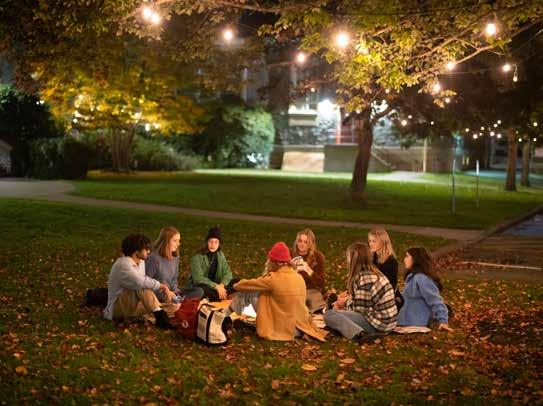
anonymous (5)
Carolyn & William Appelbe
Gillian Archibald
Kenneth Askew ∂
Joshua Bates ∂
Nancy Blake
Timothy Borlase ∂
James Boyer
Beverley Brown-Sweeting
Ronald Buckley ∂
Abagail Bumpus
Clare Christie ∂
Laurie Cook
John Cordes
Mary Jane Craik
Veronica Curran ∂
Pauline Dakin
Douglas Davis ∂
Alexa Dodge & Wesley Petite
Philip Dugandzic
Michael Dunn
Luke Dyment
Gordon Earle ∂
Mark & Lynn Etherington
Alyssa & Matthew Feir
Luke Franklin
Holly Gilkie
Lori & Bob Gillies
Elizabeth Grant
Jasmine Hare
Keith Hatfield ∂
Lillie Haworth ∂
Michael Henschel
H. Douglas Hergett ∂
Michael Hoare ∂
Barbara Hodkin
David Hugill
Kieran Innocenzi ∂
Sonya Jampolsky
Hamza Karam Ally
Gladys (Nickerson) Keddy ∂
Ross Kerr
Mary Beth Knight
Simon Kow ∂
Tracy Lenfesty
Anne Loosen
Andrew MacDonald
Kathleen MacKeigan & Chris Gibson
Rory & Genny (Whelan) MacLellan ∂
Marjory Helen Masson
M. Garth Maxwell ∂
Barbara (Neish) McArthur ∂
Stephanie McGrath
Carol Miller
Shirley Moore
Susan & Bruce Moxley
G. Warren Murley
Donald Neish*
Andrew O’Neill ∂
Richard Ortner ∂
Diane Pickard & Russell
Bamford ∂
Andréa Pilichos
Aaron Platt
Mark & Carolyn Power ∂
Jan Purdy
Leona Rodall
Gillian (Bidwell) Rose ∂
Adam Rostis
Elizabeth Rouget
Jonathan & Emily (Hunter) Rowe
Carolyn Sagness
Mary Salenieks
Stanley & Anne Salsman
Taylor Saracuse
Myra (Crowe) Scott ∂
Renee & Victor Serio
Joan Sinden
Michael Smith
Justina Spencer
Heather (Christian) Stevenson ∂
Ruby Stocklin-Weinberg
Edward Thompson ∂
Kelly Toughill ∂
Randy & Deborah Townsend ∂
Angela Walker
Terrance Wasson
John Weeren ∂
Audrey (Powell) Weir
Martin Wessman
Ian & Carla (George) Whytock
Jonathan Yule
*deceased
LEGACY
Estate of F.C. Manning ∂
Estate of John Phillips
IN MEMORY OF
Alan Abbott
Michael Bachynsky & Annie
Stachow, Ukraine
Malcolm Bradshaw
Captain Jenn Casey
Innis Christie
Borden Conrad
Robert Leo Couture
Jane Curran
Rosemarie Curran
Dr. Margaret Dechman
Jim Dodd
George Earles
Dr. Neville & Dr. Marie Elwood
Norman Grant
Rev Canon Harold Graven
Peggy Heller
James & Audrey Ingalls
Angus Johnston
Sheila Jones
Daina Kulnys
Marian (Huggard) Lines
R.J. Lownie
Elizabeth Cordes MacCara
Douglas MacKenzie
Colin MacLean
Guy MacLean
Ella and Henry Muggah
Margaret Myles
Mark Pastreich
Hazel “Iris” Richards
Anne “Nan” Patricia Yu-Li
Robertson
Phoebe Roper
Dr. Harry and Joy Smith
Janice D. Smith
Professor Kraft von Maltzahn
Leslie (Cutler) Walsh
Judith Wright
Nancy Blakeney Yeats
IN HONOUR OF Dr. Jackie Cappell
Jacob Danto-Clancy
Justis Danto-Clancy
Elizabeth Edwards
Bruce Fisher
Dorota Glowacka
Jennifer Gray
Roselle Green
Stuart Harden
Brendan Irish
Kim Kierans
Bill Lahey
Chris McBride
Margo Pullen Sly
Donald Roberts
Michal Stein BA’14
Hugh Wright
Sharon Wynn
The HOST Program
King’s great community
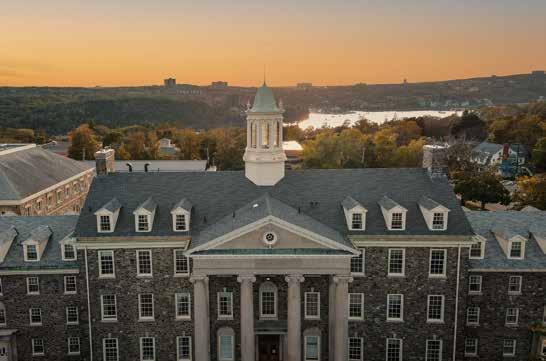
1947
Edward Thompson ∂
1948
William Sherren
1950
J. Roderick Fraser ∂
Johanne (Zwicker) McKee
1951
Hope Clement
Donald Neish*
Gillian (Bidwell) Rose ∂
1952
Frances (Smith) McConnell ∂
John Phillips*
William Skinner ∂
Audrey (Powell) Weir
1953
Marion Fry ∂
Ruth Loomer ∂
Barbara (Neish) McArthur ∂
Joan Morrison ∂
1954
Keith Barrett ∂
John Gorrill ∂
Alan Hebb* ∂
1956
Gilbert Berringer ∂
Mary Jane Craik
Harold Hazen*
Ann Pituley ∂
1957
Caroline (Bennet) Hubbard
John MacKenzie ∂
Fred Nicholson
Ben Smith ∂
1958
George Caines ∂
Fred Christie ∂
C. William Hayward* ∂
Michael Rudderham
1959
G. Warren Murley
LeRoy Peach ∂
Elizabeth (Baert) Peters
1960
Lloyd Campbell
Nicola Campbell
Arthur Peters
Fernald Wentzell
1961
James Boyer
David Myles ∂
Sandra Oxner
Richard Walsh ∂
1962
Roland Canning
John Cordes
Marilyn (Lingley) Dewis
Caleb Lawrence ∂
Thomas LeBrun
Russell MacLellan
Donald Stevenson ∂
Nancy (Clark) Violi ∂
1963
T. Frederick Baxter
Nicole Canning
Charlotte (Graven) Cochran
Gwendolyn Davies ∂
Fraser Dewis*
Gordon Earle ∂
Linda Fraser
Edward Gesner ∂
Doreen Kays ∂
Stephen Knowles ∂
Barbara (Aikman) LeBrun
Judith MacKenzie
Elizabeth (Bayne) Sodero ∂
D. Lionel Teed ∂
1964
anonymous (1)
George Abbott
Burdette Coates ∂
Blair Dixon
Lillie Haworth ∂
H. Douglas Hergett ∂
T.C. Leung ∂
Barbara Smith ∂
William Wells ∂
1965
anonymous (1)
Roselle Green ∂
Michael Hoare ∂
Nancy Leefe ∂
Deryk Smith
Carmon Stone ∂
Thomas Vincent ∂
William Williams ∂
1966
Ronald Buckley ∂
Carolyn (Tanner) Chenhall ∂
Glen Kent ∂
John Leefe* ∂
James Mann ∂
M. Garth Maxwell ∂
1967
Mary Barker ∂
Clare Christie ∂
Douglas Hazen ∂
Glenda (Cummings) Kent ∂
Carol Miller
Sandra (Munroe) Oxner
Charlotte (MacLean) Peach ∂
Sheila (Fenton) Robinson ∂
1968
anonymous (2)
Peter Coffin ∂
J. Mark DeWolf ∂
Peter Harris ∂
Keith Hatfield ∂
Anne (Wainwright) McGaughey
Cynthia (Smith) Pilichos ∂
Beverly (Zannotti) Postl ∂
Susan (McCulloch) Richardson
1969
Marilyn (McNutt) Cregan ∂
Richard Cregan ∂
Larry Holman ∂
Robert Hyslop ∂
Lina (McLean) MacKinnon ∂
David Mercer ∂
Janet Mitchell ∂
John Page
Robert Petite ∂
Helen Powell ∂
Elizabeth Ryan ∂
Lynda Singer ∂
Faye Woodman
1970
anonymous (2)
Andy Hare ∂
Anne (Dorey) Hare ∂
Kathy (Pratt) LeGrow
David Mackay ∂
Heather (Christian) Stevenson ∂
1971
Ken MacInnis ∂
John MacKay
Penny Moody-Corbett
Irene Randall ∂
Sheila Taylor ∂
1972
John Carr ∂
Joan Christie
Rachel (Swetnam) DeWolf ∂
Ian Johnson ∂
Gladys (Nickerson) Keddy ∂
Charles O’Neil
Douglas Ruck
Valerie (Morine) Ruck
G. Arthur Theuerkauf
1973
Timothy Borlase ∂
Phillip Fleury ∂
R. Brian Taylor ∂
Paul Theuerkauf
1974
Susan Harris ∂
Kim McCallum ∂
1976
Peter Bryson ∂
Mary (Lewis) Kennedy ∂
W. J. Tory Kirby
Adrienne Malloy
Myra (Crowe) Scott ∂
Geoffrey Strople
1977
Wendy Davis ∂
Michaela Huard ∂
Margaret (von Maltzahn) Kirby
1978
Robert Craig ∂
Jennifer (Bassett) MacLeod
John MacLeod
Patrick Rivest ∂
1979
Andrew Graham ∂
1980
anonymous (1)
Patricia Chalmers ∂
Bev Greenlaw
David Hazen
Stephen Lownie
Marjory Helen Masson
Shelley Shea ∂
1981
anonymous (1)
Thomas Curran ∂
David Fletcher
Elizabeth Hanton ∂
Catherine (Rhymes) Misener ∂
1982
Robert Dawson ∂
Susan Folkins ∂
Stacey (MacDonald) Forbes ∂
Kim Kierans ∂
Marli MacNeil ∂
1983
Kathleen Bain
Barry Craig
Tom Eisenhauer
Alexander Forbes ∂
1984
David Baker
Beverley Brown-Sweeting
Anne Gregory
Kelly Laurence
Bretton Loney
Karen Shewbridge
Kevin Stockall ∂
1985
anonymous (1)
Mark Hazen ∂
Shirley (Wall) Hazen ∂
Iain R.M. Luke ∂
Elaine MacInnis
Alan McLeod
Stephen Murray ∂
Neil Robertson
Kelley Teahen
John Weeren ∂
1986
anonymous (1)
Mary (Coffill) Deveau
Christopher Elson ∂
Andrew Laing ∂
Ian MacInnis
Joyce (Blandford) Millman
Peter Nathanson ∂
Angela Walker
1987
anonymous (1)
Susan Dodd ∂
Gregory Guy ∂
Julianne (Doucet) MacLean ∂
Stephen MacLean ∂
Gillian McCain ∂
Joan Sinden
Katharine Sircom ∂
Elaine Taylor
James Wood ∂
1988
Jennifer Balfour ∂
Michael Dunn
Andrea Nemetz
Terrance Wasson
1989
anonymous (1)
Jennifer Adcock
Haynes Hubbard
Laurelle LeVert ∂
Owen Parkhouse
1990
Daniel Brandes ∂
Nicholas Graham ∂
Jennifer Gray
Susan (White) Hubbard
George MacLean
Heather MacQuarrie
Theresa (Nowlan) Suart
Peter O’Brien
Elizabeth (MacDonald) Parkhouse
1991
Jennifer Mary Bell
Rebecca (Moore) Brown ∂
Paul Charlebois ∂
Michael Henschel
Colin Robertson
Kathryn Wood ∂
1992
Laurie Cook
Tim Currie ∂
Ken Dekker ∂
Bruce Geddes
Kevin Gibson ∂
Elizabeth Hayward
Sandra Penney ∂
Drew Yamada
1993
anonymous (1)
Molly McCarron
Kathryn Morris
Andréa Pilichos
Tim Rissesco
Stuart Wood
Sharon Wynn
1994
Chère Chapman
Gord Cooper
Peter Jelley ∂
Cynthia (Edwards) MacMillan ∂
Michael MacMillan ∂
Sarah E. Stevenson ∂
Lisa Taggart ∂
Christopher J. White ∂
1995
Carolyn Gibson ∂
Ross Kerr
Christina Quelch ∂
1996
Nathalie Atkinson
Roberta Barker ∂
Christina Harnett ∂
1997
Mary Beth Knight
Robert Muggah
Robyn Tingley
1998
anonymous (1)
Andrew O’Neill ∂
Emily (Hunter) Rowe
Aden Seaton ∂
1999
anonymous (1)
Gordon Cameron ∂
Andrew MacDonald
Stephanie McGrath
Shirley Moore
Aaron Platt
Jonathan Rowe
2000
Sarah Dingle ∂
Nevin French
Carl Lem ∂
2001
Matthew Aronson
Lauren Brodie ∂
Howard Krongold ∂
Thomas Ledwell ∂
Mike Sampson ∂
Valerie Vuillemot
2002
Gillian Archibald
Joshua Bates ∂
Daniel de Munnik ∂
Luke Franklin
Holly Gilkie
Lesley-Anne (Noseworthy) Steeleworthy
2003
John MacLean ∂
Andrew Sowerby ∂
2004
anonymous (1)
Mark Duggan
William Fyfe
David Herbert ∂
David Hugill
Ben Kates ∂
Thorfinn Stainforth
2005
Victoria Foley
Joanna Grossman ∂
David Henry
Wendy Hepburn
Matthew Irwin
Marco Oved
Stuart Pattillo
Chelsea Thorne ∂
Dawn Tracey Brandes ∂
Tasya Tymczyszyn ∂
2006
Jane Baldwin ∂
Terra-Lee Duncan
Clare Gibbons
Brendan Morrison ∂
Richard Newman
2007
Myra Bloom ∂
Vanessa Green
Anne Loosen
Maggie O’Riordan-Ross ∂
Miranda Spence
Mordecai Walfish ∂
2008
Michelle Deruchie ∂
Michael Smith
Ruby Stocklin-Weinberg
Martin Wessman
2009
Alyssa Feir
Chris Gibson
Sarah Jones
Benjamin Langer
Christina Macdonald ∂
Kathleen MacKeigan
2010
anonymous (1)
John Adams
Julie Bertrand
Genny (Whelan) MacLellan ∂
Rory MacLellan ∂
Carla (George) Whytock
Ian Whytock
2011
anonymous (1)
Matthew (Baker) Feir
2012
Veronica Curran ∂
Alexa Dodge
Casey Lynch
Wesley Petite
2013
anonymous (1)
Stephanie Duchon ∂
Jasmine Hare
Kieran Innocenzi ∂
Amanda Leslie
Elizabeth McNeil ∂
2014 anonymous (1)
2015
anonymous (1)
Pauline Dakin
2016
Elizabeth Rouget
Taylor Saracuse
2017
Benjamin von Bredow
2018
anonymous (1)
Abagail Bumpus
2019
Sonya Jampolsky
Taylor Simon
2020
Margaret Lynch
Ellery Platts
Jonathan Yule
2021
Michael Kishchuk
2023
Luke Dyment
2024
Kara Holm ∂
AS CAPTAIN AND A LEFT WINGER on the King’s Blue Devils soccer team, Matt Fegan was something of a star. He led the college to two undefeated seasons in the Atlantic Collegiate Athletic Association (ACAA) and back-to-back showings at the 2003 and 2004 National Championships. He was Canadian Collegiate Athletic Association (CCAA) Men’s Soccer Player of the Year in 2004, and was a CCAA All-Canadian in 2002, 2003 and 2004. He capped all of that off by being the first athlete to be inducted into the CCAA Hall of Fame.
“Over the course of his career he provided countless memorable moments and was the most decorated student-athlete in King’s soccer history,” says Neil Hooper, King’s Director of Athletics.
Although the route wasn’t direct, today he’s Sporting Director of the Halifax Wanderers Football Club and inarguably, a force behind the team’s skyrocketing popularity with Nova Scotians. And it’s likely his circuitous path—a path that included several years with an augmented reality and multimedia content company—that’s given him the skills and experience to lead the
Wanderers directly into the hearts of Nova Scotians.
Fegan’s early life and road to King’s didn’t follow a well-worn path, either. Born in Japan to Scottish parents, his father, a naval engineer in the shipping industry, moved with his company to England, Dubai, Bahrain, Malta and eventually, Halifax. Aged ten, Fegan went to England for boarding school. Stonyhurst College in Lancashire was his home until he joined his family in 2001 when they moved to Halifax, just as he was preparing to go to university.
If you’re assuming that his eight years at an English public school was the source of his soccer prowess, think again. “Ironically, Stonyhurst is one of the biggest rugby schools in England,” Fegan says. “I got into football when we lived in Malta and I went to my first competitive tournament before I was ten. At Stonyhurst, even though I was small for my age, they put me on the rugby team because I could kick.”
It was journalism that led Fegan to King’s.
“I wanted to do a BJH and that meant doing the Foundation Year Program (FYP).
To be honest, I had no inclination to do FYP. I wasn’t the biggest reader and here I was dropping into a program where, oh, by the way, we’re going to read three books a week. I certainly wasn’t like, ‘Wow, I’ve always wanted to read Dante’s Inferno,’” he laughs. Hesitation notwithstanding, Fegan was both academically inclined and capable. “The British A-Levels were rigorous and preparing for them was great training for FYP.”
Listening to Fegan describe his path, he conveys a mixture of enthusiasm and pragmatism. For example, he never thought he would play soccer professionally. “I knew at a young age I wasn’t going to be a pro athlete. For me it was about getting an education and playing at the highest level I could at the same time.” His long game, even as a boy, was to work in some facet of the sport. “I had academics in my favour. I had good grades. From an early age I had a sense that if I was going to make a career in this game it was going to be in an off-field aspect of it.”
Nor was Fegan necessarily intent on becoming a journalist, though he considers the training invaluable, applicable to any num-
No matter what you study, it’s more about the people you meet and the environments you’re exposed to…. University is about learning how to learn.
ber of professions. “How many people, at 18, really know what they want to do? No matter what you study, it’s more about the people you meet and the environments you’re exposed to…. University is about learning how to learn.” As for the people you meet, it was during his first week at King’s that he met Heather McLeod, BJ(Hons)’05, who would become his wife and mother of their two daughters.
Fegan wasn’t long out of university when he joined his brother-in-law at Current Studios, a Halifax startup producing interactive and experiential installations and apps. “I’d focused on video production in my BJH. At the time I was thinking to go back to the UK and do an MBA in football management, but I was intrigued by Current. I went for two years and stayed fourteen.” When he left the company in 2019, he was VP and Executive Producer, having developed and spearheaded major projects for top global entertainment, multimedia and automobile companies, among others.
But always, there was soccer. While at Current he did some coaching at King’s. “It helped keep my toe on the pitch,” he says.
And he volunteered his time on major sports events coming into town, honing his sports marketing skills and deepening his connections.
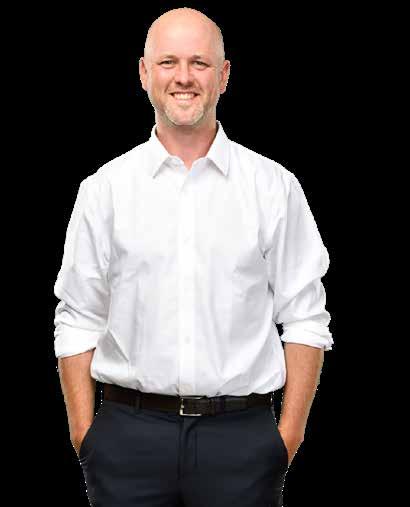
In 2018, after many meetings with Halifax Wanderers owner Derek Martin, Fegan signed on as Sporting Director, essentially functioning as team general manager. “I led the effort to build the stadium [Wanderers Grounds] and that evolved into new responsibilities like recruiting and hiring our new head coach and I work closely with him on the decisions around his roster,” he explains. And of course, there’s the full range of GM responsibilities including marketing, promotion, contract negotiations and more. “We’re building this club from the ground up. I understand startups and digging deep.”
Fueled by a growing national interest in soccer that’s been heightened by the success of Canada’s men’s and women’s national teams, Nova Scotians have wholeheartedly embraced the Wanderers. In good measure, this is also a result of Fegan’s marketing prowess and rich understanding of the game.
“That support and what we’ve achieved
is incredibly satisfying,” Fegan says, rolling through his objectives and coming plans for the Halifax Wanderers. “But there’s a lot of work to do. We have to correct our fortunes on the pitch and have the kind of game success we’ve had off the field. So off season we’ve been doing a lot of work to get the right people in place. We need to support the growth of soccer in Nova Scotia and get more people playing. In the future we’d love to have a women’s team and we want to build a pyramid towards that. We’re launching a program that takes us into schools and universities. We want to make soccer more accessible so that more kids will play.” To illustrate the power of homegrown talent, Fegan highlights one of Canada’s most successful soccer players: “Then we’ll find our ‘Alphonso Davies’ more often and not just once in a lifetime in Edmonton.”
How many people, at 18, really know what they want to do? No matter what you study, it’s more about the people you meet and the environments you’re exposed to…. University is about learning how to learn.
WHAT DO YOU GET when you take one cup of Warsaw borscht, one prompt from an old friend and one intensive, comprehensive program seasoned with three expert editors? A recipe for an unexpected memoir about the complexity of heritage and the enduring connections of faith, family and food.
It was a bowl of borscht in Warsaw that set Bonny Reichert down her latest path. She was in Poland for the first time, the birthplace of her father, who is a Holocaust survivor. For as long as Reichert could remember, her father had always said there was no need for him or anyone in his family to return to Poland, and she never had any interest in going. But when her father learned about a family tomb in Warsaw, he wanted to visit it. Reichert went with him on the trip, along with her mother, one of her sisters and one of her nephews. After a lifetime of avoiding the country, protected from fully engaging with that part of her family’s history, Reichert was apprehensive about the trip. But her father wanted her to be there, so she went.
“We went to the cemetery. It felt creepy,
it felt weird. But we found the tomb, and he was very happy,” she says. “After the cemetery, we went to a restaurant. And the restaurant looked like it was going to be terrible. It was dead, no customers. I thought the food was going to be awful. And they came out with this borscht, it was this beautiful, clear, fresh borscht. Ruby red-coloured, so lovely, and all these beautiful garnishes. I started to think, ‘Oh, maybe I have some real connection to this place.’”
That connection is the core of Reichert’s upcoming book, How to Share an Egg, a memoir about her relationship with food as the child of a Holocaust survivor. Reichert didn’t know what her book would be about when she signed up for the Master of Fine Arts in Creative Nonfiction at King’s, but she knew it was going to be about food.
“That’s my background. My father ran restaurants, I grew up in the restaurant business. So food is really a throughline for me. My father is still living. He’s 92, and continues to love food, take pleasure in food, has really modelled a type of joy in living through food … I would say that he is
enacting healing every time he sits down to eat,” she says. “So I knew that that was going to be part of it.”
Reichert’s relationship with the restaurant industry is not limited to her childhood—it defines her professional life as well. She started her career as a journalist, working for Today’s Parent and Chatelaine among other publications, but when she turned 40 she decided to go to chef school. After working as a chef for a short while, she returned to journalism as a food writer. Her combination of passion, talent and experience gave her a decisive edge, leading to a position as a food editor for Inspired and a food column in the Globe and Mail Eventually, though, Reichert felt like she was no longer growing in her field. She always likes trying new things and always knew she wanted to get a master’s, so her next step was going back to school. She just wasn’t sure what she would study.
When Reichert worked for Chatelaine she had met Kim Pittaway, the former Executive Director of the MFA in Creative Nonfiction and now a Cohort Director in the

I didn’t want to write about myself, and I couldn’t see a path toward writing about myself. But I had a story right at my fingertips.
program. Around the time when Reichert was contemplating her next move, they ran into each other at a wedding, and Pittaway suggested the Creative Nonfiction program. A few months after the wedding, Reichert called Pittaway. Though her interest in the program was growing, she wasn’t sure if she had a book to write that would make it worthwhile.
“I didn’t want to write about myself, and I couldn’t see a path toward writing about myself. But I had a story right at my fingertips,” Reichert recalls. “I said to Kim, ‘Nobody’s going to want to read about me, I don’t have a story.’ And she said, ‘Every journalist starts by thinking that. We always think that the story has to be about someone else.’ So in a sense, she gave me permission in that conversation to think about the universality of a story I might have to tell, and how that isn’t necessarily a self-centred thing to do.”
The push from Pittaway may have been necessary, but Reichert couldn’t do it alone from there. Writing a book for the first time was “a chaotic process,” Reichert says,
because “you have no idea what you’re doing at first.” Now, though, thanks to the MFA program, she has almost completed her book, and has a deal with a publisher in New York to help share her story with the world.

“It’s because of the program. The program is very focused on making a book. It’s very practical in that way. If it weren’t, I don’t think my feet would have been held to the fire in quite the same way,” Reichert says. “The mentors are really great about supporting you through the process, hearing what’s coming out on the page … I knew when I was starting to get warm and I thought I was near the end of the process, and one of my mentors said, not unkindly, ‘You’re just starting to find the vein that you need to keep working in.’ The depth, that was new to me. And having somebody read it was amazing. I worked with three different mentors during the course, and each one brought something different.”
Looking back, Reichert believes she was attracted to the MFA because some part of her knew this story needed to get out, even if she wasn’t consciously aware of it at
the time. Once she began the program, her mentors felt the same way, she says.
“More than one mentor said, ‘Oh, it’s so obvious that you have to get this out. It’s about so much more than completing the requirements of the program.’ So, the program did a lot for me. It was very good for me.”
It’s because of the program. The program is very focused on making a book. It’s very practical in that way.
Canada gave me the best education, so why not give it back to where I was born?
IN CALGARY, THERE IS a well-known career guide. If you are a newcomer to Canada, he is the one who will find you a job. They call him the “resumé guru,” and legend has it that you’re not getting hired if he hasn’t touched your resumé. His services are so coveted people wait six weeks for an appointment, and if he isn’t in, you don’t see anyone else.
This person is King’s alum Paul Atanya.
Atanya has worked as a career counsellor for over two decades, helping immigrants find jobs that maximize their skill sets. Having moved to Canada from South Sudan in the late ’80s, Atanya says he understands their unique challenges and the discouragement they sometimes feel trying to find employment.
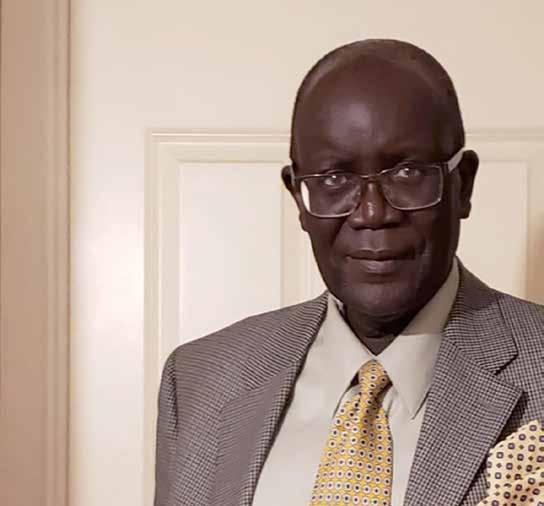
But that’s jumping ahead.
How did Atanya become Calgary’s resumé guru? Partly, being in the right place at the right time. Primarily though, Atanya credits this to the skill he considers the most valuable to a job search: networking.
Atanya got his start as a junior UN employee in South Sudan. His boss at the time was impressed with his work and asked him
to quit and attend university in Canada. “I said that I wanted to study in a small city by the sea,” Atanya says. His boss knew about King’s through a friend and floated the idea of attending the small Halifax school.
In January 1989, Atanya stepped onto the tarmac in Toronto and was greeted by an unusually frigid -30 C day. “When I saw my breath, I panicked,” he laughs. “That was my first impression of Canada. It looked like there was sugar on the ground.”
Atanya was awarded the John Godfrey Travelling Scholarship and completed his undergraduate degree in political science. “I was the only Black student at King’s,” he says.
After graduating in 1993, Atanya was named to the president’s list of distinction and moved on to pursue a master’s in Marine Management at Dalhousie. Atanya said he originally planned to return home and find work in Port Sudan until the ongoing civil war convinced him to change tack. He remained in Canada and applied to become a citizen, eventually leaving the East Coast to find work in Alberta.
Atanya’s success as a career advisor
comes from his intuitive ability to identify and highlight skills on a resumé. “I’m not really a resumé guru—I just help people communicate their skills (so) that the employer can understand the value of their qualifications and experience,” he explains. He says that people often write job descriptions instead of explaining what they contributed or how they grew in a role. “Telling an employer that you have 20 years of experience is not sufficient. What have you achieved in those 20 years?”
Atanya gives the example of his first job in Canada, working for campus security at King’s where he highlighted his transferable skills to get the job. “You might not have the experience, but you have the knowledge,” he says.
Atanya says it is client feedback and seeing them succeed that keeps him “kicking” and going into the office daily. “Having them go through this system and succeed—that’s really very rewarding for me.”
Though he couldn’t return home to work, Atanya still found a way to give back to the people of South Sudan by spearheading an initiative to build a rural junior high school
during the mid-aughts. And he did it by collecting empties.
“If I ask people for five dollars, even a toonie or loonie, they might not be willing to give it, but if I ask them for their bottles and cans and recyclables, they’ll give (them) to me.”
Atanya still collects bottles and puts the money toward supplies and maintenance at the school.
“I go to South Sudan every year (to visit)—last year, the kids at my school won a (soccer) competition in the district,” he says with pride. “Canada gave me the best education, so why not give it back to where I was born?”
Atanya’s other passions include writing and music. He formed his first band with friends while studying at King’s and has since travelled across the country from British Columbia to Nunavut, playing traditional African music. Still, he’s not opposed to an AC/DC cover. “My favourite is Back in Black,” he laughs—a song he first heard on campus at King’s and says stuck with him. Atanya has also published four books, including a guide for new Canadians called
Destination Canada: Tools for Success, which encapsulates much of the knowledge he has attained throughout his career. His novel, Bloodshed in Mana, digs into South Sudanese history and culture and is read at some African universities.
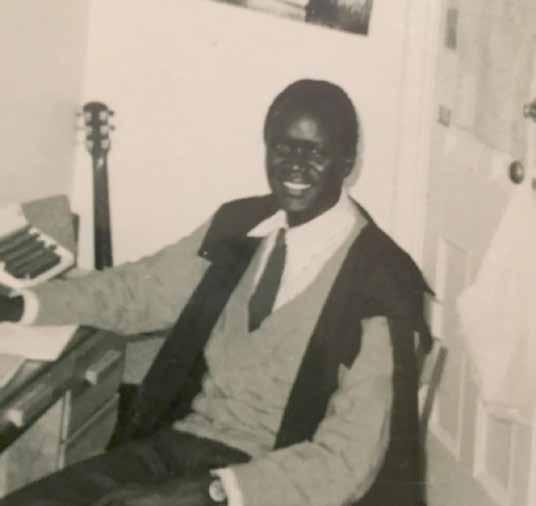
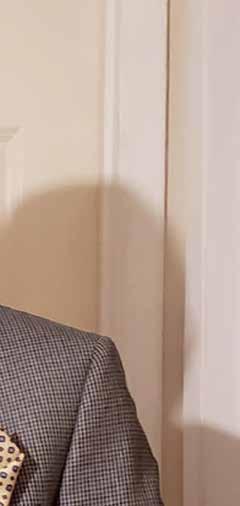
Reflecting on the last 30 years, Atanya attributes his success to networking. Education is essential, he says, but putting yourself out there, making connections, showcasing your skills and communicating that you’re eager to learn is how you turn a degree into a career. His advice for new graduates? Take your job search off the internet: “Find a mentor—someone who has recently retired or is already working at an organization. Say, ‘Hey, I don’t have the experience yet, but I’m willing to learn.’”
And above all, don’t sell yourself short.
“You can start at the entry-level, but there’s no point in selling yourself short if you can function at a higher level,” he says. “Don’t tell the employer you are a nuclear physicist and want to work in the kitchen.”
When I saw my breath, I panicked.
That was my first impression of Canada. It looked like there was sugar on the ground.RIGHT: Paul Atanya during his student days at King’s
LIZ JOHNSTON DIDN’T WANT to go to university. She had been taking classes and performing at Toronto improvisational theatre companies since she was 13 and that’s exactly what she wanted to do. Her mother, however, had other ideas so Johnston got in gear. “I was looking for a program that was interesting and different and I discovered King’s Foundation Year. ‘It will be one year,’ I thought. ‘I’ll read my way through the Western canon and when the year’s up I’m gone.’ But by the end of that year I’d made such good friends, I was liking Halifax and the future courses I could take looked so interesting I decided, ‘Well, maybe another year.’”
A great many students who would become successful, creative artists have made their way through King’s over the years and Johnston, now a Toronto-based actor believes she was there at a particularly rich time. “I was lucky to be there when I was,” she affirms. “There were a lot of like-minded theatre folk and a lot of creativity in the King’s community at the time. The number of people who are making film and theatre today who came from my period at King’s is particularly high.”
Johnston, who took Early Modern Studies and Theatre Studies brought her improv experience with her to King’s. She performed with the King’s Theatrical Society and was society president for a year.
“I wanted to make comedic theatre and I was craving improv. In improv you and
the people you’re on stage with get to create something out of nothing. And you feed off what the audience gives you. It’s exhilarating.”
There were some opportunities to do improv at King’s and at Dal, but most of the staged theatrical work being done was more serious. So she started a small theatre company with another King’s student to produce comedic theatre.
She began writing and performing shows with friends, setting a foundation for her eventual reintroduction to theatre in Toronto. “I came out of school at a time when more and more actors and theatre artists were creating and staging their own work.”

After graduation, Johnston headed home where she joined an all-female improv troupe. “That felt groundbreaking,” she says. “This was the time when people were saying that women weren’t funny. But it was also the early days of people creating their own work and putting it up online. That was really exciting.”
Johnston became a member of renowned company, The Second City’s National Touring Company and became a repertory member of Bad Dog Theatre, one of the country’s best improv companies. She continues to perform with both today. The pandemic may have taken the “live” out of “live theatre,” but Johnston and her creative colleagues were unfelled. She recently finished a run of a Canadian Comedy Award-nominated show she co-created, Entrances and Exits,
at Tarragon Theatre. The run included guest appearances by Canadian comedian Colin Mochrie. She worked with fellow King’s grads Mitchell Cushman, BA(Hons)’08, and Griffin McInnes, BA(Hons)’11, at Outside the March Theatre Company to create a highly acclaimed, New York Times-featured theatre piece performed over the telephone. At time of writing, she’s performing at The Second City’s new Toronto theatre.
Like many theatre artists, Johnston’s chosen work is a family affair; Connor, her husband, is a technical director at The Second City. Her love of sketch comedy and improvisation started early. “My mother loved intelligent comedy. I was raised on SCTV, early Saturday Night Live and Monty Python’s Flying Circus.”
A deep well of self-belief has helped guide her through the always-variable field she’s chosen. “My mother was a huge force of nature,” she explains. “She built a major consulting firm. I was aware of what she was doing and what it took. I realized that it was all her. And then at King’s ... I was lucky enough to be surrounded by all these intelligent women who were doing exactly what they wanted to be doing and were doing it brilliantly. I’ve been lucky to think that that is the norm.”
I was lucky enough to be surrounded by all these intelligent women who were doing exactly what they wanted to be doing and were doing it brilliantly.
In FYP we were encouraged to ethically state our positions. We learned how important that is for others, and for ourselves.
HOW MANY OF US , at 27, have a resumé with educational and career credits that are both impressive and intriguing? It’s leveling then, to see that among the embassy and government positions Frederik Hayward has held—he currently works as a policy analyst at the German Bundestag—there are a few stints as a restaurant line cook. That, he laughs, is a whole other story, one of “flying pans and drizzling nacho sauce.”
Born in Freiburg, Germany and raised in Ottawa, Hayward arrived at King’s in 2013 for the Foundation Year Program (FYP). He was undaunted by the idea of a year reading the great books; the International Baccalaureate Program he took in high school prepared him well for it. Ultimately it was a King’s information night in Ottawa that sold him. “It was going to be a lecture on piracy, and I was a bit doubtful … I mean, pirates? I thought this was going to be some kind of joke lecture,” Hayward explains. “But it was an incredible lecture on the history of international law. It was a catalyzing moment.”
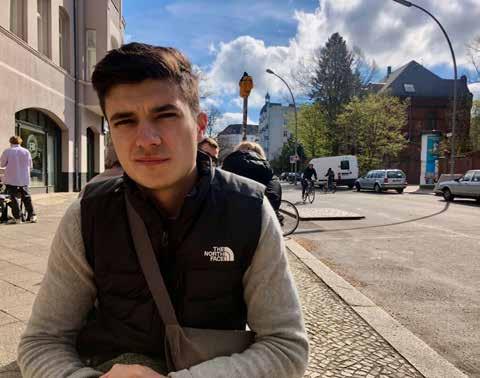
Hayward speaks passionately of King’s and FYP. “It was a very special year in my young life. I have friends from that year who are still my best friends. Even though we spread over three continents and however many time zones, we are still in very close contact.” He speaks fondly of his dons, in particular Cliff Lee, BA’10, and his wife Cindy Lee. “They created a really safe space for us to do what young people our age do.” And Hayward, who played rugby at King’s,
remembers the athletic community that was so important to him. “As a small school, King’s wasn’t necessarily known for its athletics, but I think it was a more spirited athletic community than you find at the bigger schools.”
Hayward worked as a game statistician and became Head of Gameday Operations. He credits FYP for playing a significant part in his achievements. “You’re taught not just to respect other peoples’ opinions but also to respect your own. We are often taught to listen to other people but not always to ourselves. In FYP we were encouraged to ethically state our positions. We learned how important that is for others, and for ourselves.”
Within his honours degree in Contemporary Studies and Philosophy, Hayward began to explore his heritage. “Not in a nationalistic, patriotic sort of way, rather as an exploration of German philosophy and contemporary thought,” he explains. That exploration continued in graduate school; he did an MA in European and Russian Affairs at the Munk School of Global Affairs at the University of Toronto.
A position at the German embassy in Ottawa put in motion a career path that had come into clear focus while at graduate school. “My experience at the embassy was incredible,” Hayward says. “I got to take my theory background and start applying it to real world problems.” As a press and communications officer, he helped the
embassy develop its social media program and cultural offerings. Hayward also worked as a policy advisor in economic affairs and science and helped on the protocol team for an official state visit. “I got to be a part of advising on economic affairs and innovation, develop diplomatic briefs and work on green hydrogen and critical mineral initiatives. And I got to work directly with the ambassador,” he enthuses.
A year later, an internship at the German parliament in Berlin blossomed into his current position as a policy analyst in the federal parliamentary office of a Social Democrat MP. “I’m in charge of research and writing on a range of files, providing behind-the-scenes support and broad-ranging information for my MP. I have to make sure I have my finger on the pulse of what’s important to him.”
The chronicling of Hayward’s progression, of course, belies the strategic thinking, commitment and sheer enthusiasm he has for the work he’s chosen and the life he’s living. He loves Berlin, where he’s a road cyclist and a runner, and he thrives on the city’s cultural diversity. The next step: Hayward, faultlessly bilingual, has placed himself on a path to potentially become a career diplomat in Germany. “I know I want to work in an international capacity, and I love the idea of going to a country, learning what I can of the language, doing a crash course on the culture and bringing that understanding back home … if that’s a job, I’m in!”
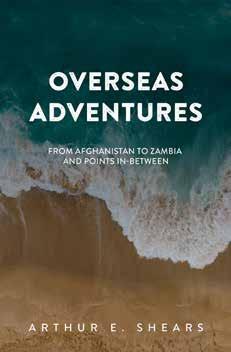
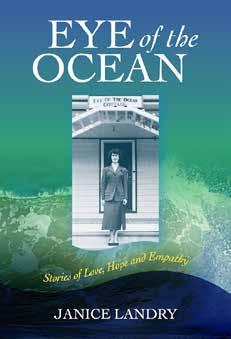
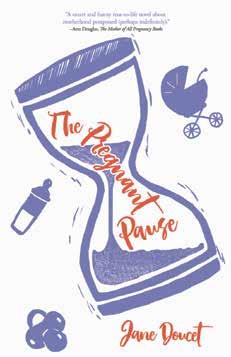

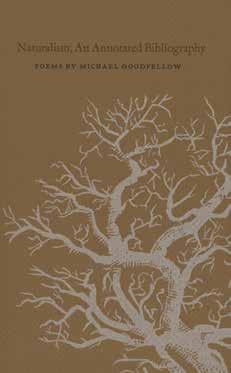

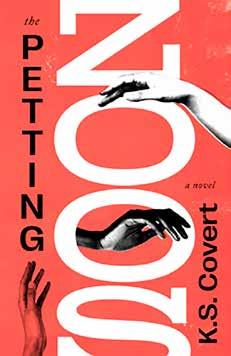
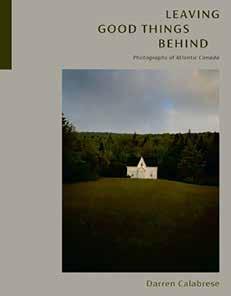
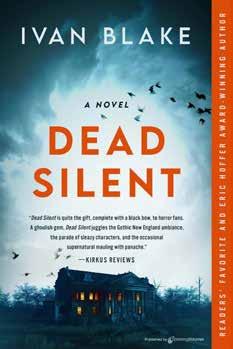
Dark fiction writer Ivan Blake, ’69, recently released Dead Reckoning (Speaking Volumes LLC., March 2023), the third book in his Mortsafeman horror trilogy. While Kirkus Reviews has described Ivan’s writing as “gloriously macabre” and a “monstrously good romp,” his books are graphic and not intended for sensitive readers.
Arthur Shears, BSc’71, has written a memoir titled Overseas Adventures. The memoir describes his experiences and adventures as he worked abroad in 16 different countries— places as diverse as Saudi Arabia, Burma and Sri Lanka, from 1971 to 2021.
Ann Leamon, BA(Hons)’83, just completed writing the second edition of Venture Capital, Private Equity and the Financing of Entrepreneurship (J. Wiley, forthcoming) with Dr. Josh Lerner of Harvard Business School.
Mary Graham, BJ’87, has written a book on filmmaking in Alberta, after years as a documentary journalist and consultant to the offshore oil and gas industry. A Stunning Backdrop: Alberta in the Movies, 1917–1960 (Big Horn Books, 2022) is the untold story of Alberta’s film history: defined by the terrible beauty of its pristine landscape, surprising importance to Hollywood and recaptured in lost or ignored Indigenous perspectives of stories.
Janice Landry, BJ(Hons)’87, published her sixth work of nonfiction in November. Eye of the Ocean (Pottersfield Press, 2022) contains stories of love, hope and empathy, featuring interviews with 21 Canadians. Landry is donating all proceeds from sales of this book to the HEART Society of Nova Scotia (The Hants East Assisting Refugees Team). HEART is a non-profit that brought a Syrian family, the Barhos, to Nova Scotia. Tragically, the Barhos’ seven children died in a Spryfield house fire in 2019. Eye of the Ocean is a tribute to the Barho family and HEART, along the many first responders and community members who helped in the fire’s aftermath.
Newfoundland publishing company Boulder Books, started in 2002 by Gavin Will, BJ’89, celebrated its twentieth birthday this year. Publishers of the enormously popular Saltwater Knits series, Boulder has been recognized with multiple awards for their quality, design and innovation. Managing Editor for Boulder Books, Stephanie Porter, BJ(Hons)’97, oversees a wide range of titles, with more than 10 new books released in 2022.
K.S. (Kim) Covert, BJ(Hons)’90, published her first novel, The Petting Zoos (Dundurn Press, May 2022). The book, begun in 2009, explores the themes of social and physical isolation through the lens of a world still recovering from a devastating pandemic 10 years later.
Roger Thompson, BA(Hons)’91, is pleased to announce that he has been appointed as a Research Fellow at the Centre for the Study of Security and Development at Dalhousie. This achievement is the culmination of decades of study and the publication of two books on the US Navy (USN). His second book, Lessons Not Learned: The US Navy’s Status Quo Culture, investigated corruption and incompetence in the USN and for that he was awarded a Fellowship in Great Britain’s prestigious Royal Society of Arts. He currently resides in South Korea but will return home to Canada in 2024.
Jane Doucet, BJ(Hons)’93, is pleased to announce that Nimbus Publishing’s fiction imprint, Vagrant Press, will be re-releasing her 2017 self-published debut novel, The Pregnant Pause in spring 2023, and publishing her third novel, Lost & Found in Lunenburg, in fall 2023.
Acclaimed documentary and editorial photojournalist, Darren Calabrese, BA’03, will soon publish a stunning and surprising collection of photographs and stories from Atlantic Canada, Leaving Good Things Behind (Penguin Random House, May 2023).
Michael Goodfellow, BA’06, has published his first collection of poetry, titled Naturalism, An Annotated Bibliography (Gaspereau Press, 2022).
Rory O’Sullivan, BSc(Hons)’06, was honoured to be this year’s recipient of the College of Family Medicine of Canada (CFPC) Mimi Divinsky Award for History and Narrative in Family Medicine for a short piece entitled “Traffic Patterns.” The story will be published in the Canadian Family Physician Journal in early 2023.
Shannon Fay, BJ(Hons)’09, published her second novel in November. External Forces (47North, 2022) is a fantasy novel set in 1950s London and is the sequel to Shannon’s debut novel, Innate Magic, which came out last year. External Forces received rave reviews, including a starred review from Publisher’s Weekly
Sheima Benembarek, MFA’20, is publishing her first book of nonfiction titled Halal Sex: The Intimate Lives of Muslim Women in North America (Penguin Random House Canada, March 2023). It’s an unprecedented glimpse into the sex lives of female and gender-expansive Muslims living across Canada and the United States.
The deportation of thousands of Acadian settlers in the mid-eighteenth century from their homes in today’s Maritime provinces is one of the darkest events in Canadian history. And the remarkable survival of the Acadians and their Cajun cousins in Louisiana is a testament to human endurance in the face of war, exile and untold suffering. MFA in Creative Nonfiction Cohort Director Dean Jobb tells this dramatic story in The Acadian Saga: A People’s Story of Exile and Triumph (Nimbus Publishing, 2022), an updated edition of a book that serves as a bridge across the centuries for descendants of a founding people of this nation, whose courage and resourcefulness still resonate in modern-day Acadie and Louisiana.
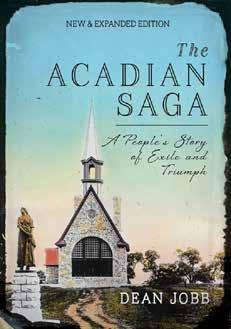
Instructor Lezlie Lowe, BA(Hons)’96, MFA’16, recently released her second book, The Volunteers: How Halifax Women Won the Second World War (Nimbus, 2022). Shining a light on the hidden heroes of the Second World War, the book traces everyday Halifax women volunteers who stepped up to provide the help, hope and healing that kept the city afloat during six years of war. The women whose wartime volunteering was essential to the well-being of service members and to winning the war itself, saw their work go unrecognized and forgotten in the flurry of post-war battle commemoration until now.
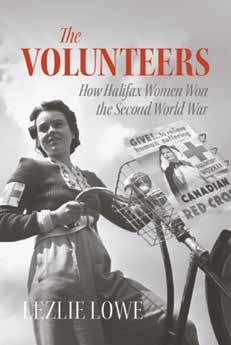
Inglis Professor Sylvia D. Hamilton published Tender (Gaspereau Press, 2023). The poems in Tender chronicle the experiences of Black people, especially of Black women, in their quest for self-determination and their desire to live full, complex, unencumbered lives. Employing her skills as a documentary filmmaker, Hamilton combines reclaimed historical accounts, memories and stories to engage subjects such as intergenerational trauma, racial violence, the silencing of girls and women, and the loss of children.
Running throughout her work is a yearning for genuine equality and freedom, and an understanding that a better future begins with engaging honestly with our past.
At the launch of Tender in January 2023 at King’s, Hamilton invited King’s alumni Sarah Poko, BJ’16, and Grace Rowan-Quansah, BA’22, to read selections from the book along with her. The King’s Co-op Bookstore has copies for sale in person or online.
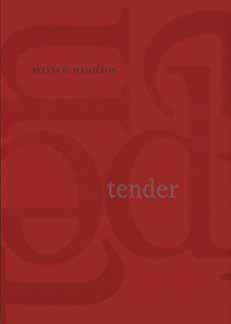
Carnegie Professor in Humanities and Computing Dr. Aaron Wright is co-editor with Diana Coleman and David Kaiser of Theoretical Physics in Your Face: Selected Correspondence of Sidney Coleman (World Scientific, 2022). Sidney Coleman (1937–2007) was a renowned theoretical physicist, who taught for more than forty years at Harvard University. He contributed critical work on quantum field theory, high-energy particle physics, and cosmology. This selection of his previously unpublished correspondence illuminates changes in theoretical physics and in academic life over the course of Coleman’s illustrious career.
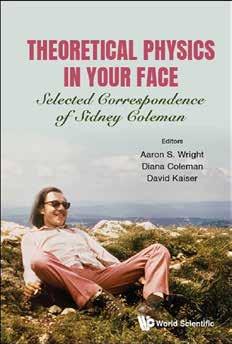
Read more details on these alumni achievements in the Alumni & Friends section of King’s website: www.ukings.ca/alumni
60s
Ronald C. Gilkie, husband of Mary Barker, BA’67, HF’97, and a longtime friend to the university through service on various committees, which earned him the Order of the Ancient Commoner in 2011, was recently profiled by Dalhousie’s Faculty of Engineering. “Ron Gilkie’s Dedication to Learning and Teaching” discusses how Ron, who received a Bachelor of Science as well as Bachelor and Master of Engineering degrees at Dal, made a name for himself in the world of engineering with a successful 40-year teaching career.
Roselle Green, DCL’15, Dip’J65, is one of a number of Nova Scotians to be recognized by the province recently with the award of a Queen Elizabeth II Platinum Jubilee Medal (Nova Scotia). The medal is conferred in commemoration of the 70th anniversary of Her Majesty’s accession to the throne as Queen of Canada and in recognition of a person’s “dedicated service to one’s peers, community, the province and Canada.”
70s
The Rev. Dr. Kenneth J. Wissler, M.Div.’71, has returned to Nova Scotia and now resides with his wife Bernice in Halifax. He recently published a book of devotions, Encounters with the Word
80s
Tim Lownie, BSc(Hons)’84, was recently named Vice-President, Global Markets at Goldman Sachs. He currently lives in Toronto.
Nancy Waugh, BA’89, BJ’90, is Senior Manager of Journalistic Standards and Public Trust for CBC News. Nancy has spent her entire career with CBC, most recently as Managing Editor for CBC News in Atlantic Canada. She lives in Dartmouth, N.S.
Henry Howard, BA’89, is owner and Principal at H2 Architecture Ltd. in Edmonton, Alta. He designed the renovations of Sacred Heart Catholic Church of the First Peoples, visited by Pope Francis during his recent visit to Canada.

David G. Jones, BA’92, is now the owner of a small boutique hotel in rural Spain. Villa Otivar, Boutique Casa Rural is a beautiful five-room Spanish townhouse located in the mountain village of Otivar, in the province of Granada.
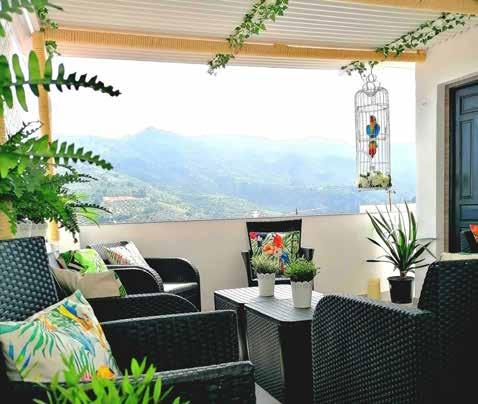
Dr. Mark Davidson, BA’91, was deployed to Kuwait with the Canadian Armed Forces until May 2022. He served as the flight surgeon for the operational support hub on Operation Impact—Southwest Asia.
Catherine Elgie Novis, BA(Hons)’93, started working as a research nurse at the Great Western Hospital in Swindon, U.K., in April 2021. She is very excited about this challenge. Catherine is involved in studies that include Covid treatment trials, antibiotics in orthopaedics post-surgery, the need for magnetic resonance imaging in people needing gallbladder surgery, newly diagnosed Type 1 diabetics over 30 and genetically mapping phenotypes in inflammatory diseases to improve and target treatments.
Jane Doucet, BJ(Hons)’93, backfilled a maternity-leave role as Manager Media Relations within Dalhousie University’s Communications, Marketing and Creative
Services office from mid-April to mid-October 2022. From October to January 2023, she worked part-time as a Communications Advisor in Dal’s Faculty of Health, Dean’s office. She then returned to freelancing fulltime as principal of Jane Doucet Content Communications, and she’s looking forward to the spring re-release of her debut novel, The Pregnant Pause and to the fall launch of her third novel, Lost & Found in Lunenburg, both from Vagrant Press.
Sue Balint, BJ’97, was named executive director of the Bonavista Biennale, an innovative, rural-based, public art event occurring every two years on Newfoundland’s Bonavista Peninsula. Balint says, “This land—the Bonavista Peninsula—is so close to my heart, so inviting for artists to respond to. I can’t believe the many stars that have aligned to create this new path for me.”
Antonia Sly Nichols, BA’99, is now Manager of Institutional Research at Nova Scotia Community College (NSCC). With an MA in criminology and a certificate in Adult and Community Education, Nichols has worked more than 17 years at the college and has been working as an Institutional Research Analyst in Policy, Planning and Research for the past seven. Nichols is currently enrolled in the Leadership Essentials program at NSCC.
Benjamin Leszcz, BA(Hons)’03, has launched a company called Wilda, which offers low-alcohol, bee-friendly natural spritzers made with honey and fresh-pressed juice. The beverages are currently available in Toronto and Prince Edward County, Ont., and will soon be available across Canada.
Playwright, actress and singer Lindsay Kyte, BJ’00, had two musicals being performed in the Maritimes in the summer of 2022. Dear Rita, a musical about the life of Cape Breton singer/songwriter Rita MacNeil, which Lindsay also performs in, played at the Savoy Theatre in Glace Bay, N.S. in May. Lindsay’s second piece, Open Casket, Open Mic, based on a real funeral home which hosted an open mic night to earn extra money, ran from July to September at the Victoria Playhouse on Prince Edward Island. The music and lyrics for that show were co-written by Terra Spencer, ’99 Photo by Philippe Maurice.
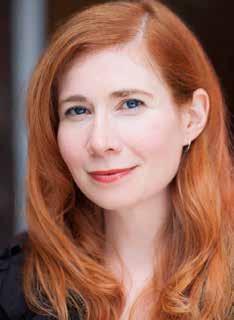
Victoria Foley, BJ(Hons)’05, has joined the administration of Maine Governor Janet Mills as Legislative Policy & Media Liaison for the Department of Economic & Community Development, working under Commissioner Heather Johnson. The role will represent the department on legislative matters and provide communications support for internal and external audiences. Victoria previously served as a State Representative in the Maine Legislature (2018–2020).
In 2022, Arran Smith, BA’09, received a Master of Arts in International Humanitarian Action from Uppsala University in Sweden, through the Network of Humanitarian Action (NOHA) Joint Master’s program. During her studies she completed a specialization period in forced migration and human security at the University of Malta, followed by a work placement with a legal aid NGO in Greece. Her master’s thesis research focused on accountability and ethics in the production of humanitarian photography on search and rescue ships in the Mediterranean Sea and explored photographer practices in obtaining informed consent.
10s
Together with co-curators from across North America, Dr. Ely Lyonblum, BA’10, (neé Rosenblum) launched the exhibit Sounds of Religion with the Smithsonian Institution Traveling Exhibition Service. Dr. Lyonblum is a graduate of the Contemporary Studies Program at King’s.
Rachelle McKay, BA’10, has been appointed to the position of Education Developer, Indigenous Knowledges and Ways of Knowing, at the Dalhousie Centre for Learning and Teaching. In this role, Rachelle works to support Dalhousie and King’s faculty interested in Indigenizing course and program curricula and decolonizing teaching practices.
After five years with the Province of Nova Scotia, Alumni Association Executive Secretary Adria Young, BA(Hons)’10, is now the Marketing & Communications Advisor for Events East Group, which manages Halifax’s premier events spaces, the Halifax Convention Centre and Scotiabank Centre.
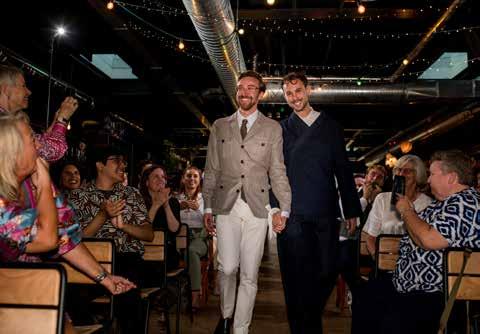
In February 2023, Halifax native Nicole Feriancek, BJ(Hons)’12, was named Editor-in-Chief of the Ottawa Citizen and Ottawa Sun newsroom.
Natascia Lypny, BJ(Hons)’13, was recently named one of the Top 25 Under 35 by Editor & Publisher Magazine. Since 2018, she has worked as the features producer for CBC Saskatchewan in Regina—a role she built from the ground up. Projects she has led have been honoured with two dozen awards. Last year, she also began filling in as host on CBC Saskatchewan News. She encourages you to reach out to reconnect!
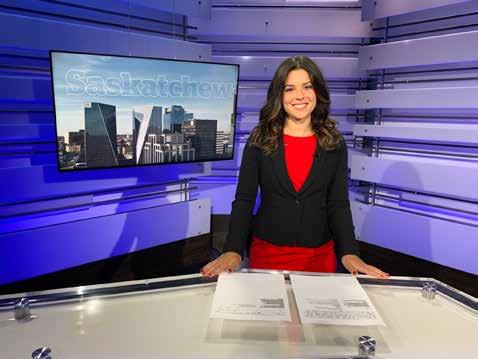
ON FEBRUARY 17, John MacDonell’s many friends, colleagues, and confidants faced a world without him. This unbearable news left us stunned and confused. John was a light, a laugh, a smile, and part of our stories and our lives.
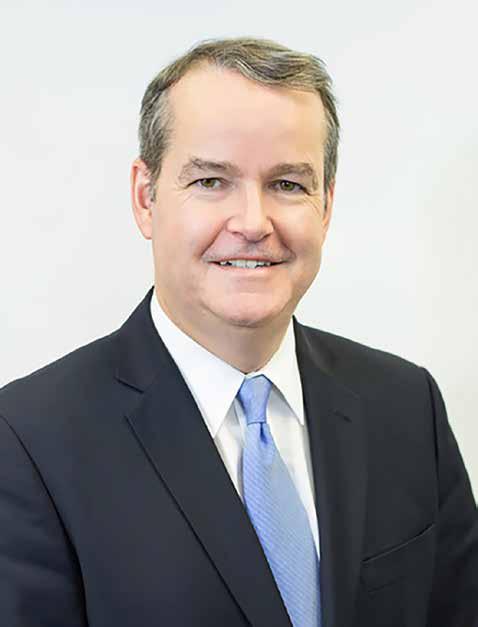
John came to King’s from Antigonish an accomplished skier, an even better debater, and ready to exercise a keen intellect. Most will remember his sharp wit and loyal friendship.
Despite an inherent shyness, John had an immense presence at King’s. A Radical Bay resident, he was Chair of the Quintilian Debating Society, demonstrating a unique skill at argumentation and persuasion, later honed in his outstanding mooting at law school. Spending hours preparing for debates, and assisting less gifted “Quintilians,” too, John’s vigorous opinions gave no quarter when a principle was at stake. Opponents (even friends) would discover days later, perhaps at breakfast or over a pint at the Wardroom, that John was still in “debate mode”; it was best to never let one’s guard down.
John enjoyed informal gatherings (he’d often leave briefly, inexplicably, to don his blazer), surreptitious meetings of the Rumour Committee, and practical jokes. Some were notorious: floormates “lost” their hallway door; John hiding in a residence room to surprise (terrify, really) the occupant upon their return. As a Campus Police member, John had the authority to fine other students. Some infractions were comical: $20 for attending an “upper Canadian lobster party without an invitation,” or “playing music offensive to good taste.” Once, when
John was uncharacteristically noisy, he fined himself for disturbing others; “it’s only fair,” he declared. It’s hard to imagine that ever happened before, or after, John’s time at King’s.
After King’s, John studied law at Dalhousie, which surprised no one, given his fondness for rules, law, service, and politics. What was surprising, however, was his apparent laissez faire approach to getting there. While others diligently prepped to “ace the LSAT,” John simply showed up to write it. Being John, he completed it with time to spare, and scored in the top percentile. Was it a whim? Surely not; he knew he was bound for law school. At Dal the next stages of his life came together, as advocate, volunteer, change-maker, and a key player in Canadian federal politics.
John’s time at King’s was instrumental in his work, personal life, and service to community and country. As Dad to Jack, he had his greatest achievement.
John loved his time at King’s. While he would be saddened by his friends’ grief, he would be lifted knowing his passing brought together those he knew and loved in observance and blessed memory. You are forever with us, friend.
Thank you to George MacLean for helping us celebrate John’s contributions to King’s and his love for the university. We invite you to read more about John’s distinguished professional career at macisaacs.ca/tribute/ details/610/John-MacDonell/obituary.html
(continued from pg. 34)
What are some of the most pressing challenges you think FYP faces in the next 10 years? And how might the program address these challenges?
ILKAY: Tim and I were talking about this. And we said that every challenge can and should be seen as an opportunity….
I think that the program, going forward as it designs its syllabi, will have to say, ‘Okay, what are different kinds of students demanding?’ If we diversify our student body, which I’d love to see FYP keep doing, how will the critiques and expectations of those students force us to reflect on our curriculum?
… There are beginning to emerge different ideas of what FYP is … How far could we take this, while keeping the spirit of this program, which I think is unique…. I think it was the best first-year experience possible for me. How can we keep that, but also respond to different concerns? Concerns that we didn’t even see 50 years ago?
BRANDES: I think that’s beautifully said. And I think that’s right … this gets back to what I think is one of our theoretical challenges, which is to have this kind of conversation about how to understand … [curriculum] diversification.
In confronting the challenge of opening ourselves up to what is different, the words we use to describe this ‘opening up’ will matter a great deal.
CLARKE: … One of the future problems, opportunities, difficulties, that FYP will encounter is, as [Daniel] said, about the terms that we use. So FYP is a program in some sense about the West, right? And increasingly, we have students and faculty who do not regard that as an intellectual home, who are not products, so to speak, of the West, have a different relationship to it. I have a deeply ambivalent relationship to that tradition, as I think many people do….
That’s something that we’re always
grappling with, that question and problem, but I think it will become a source of greater attention as faculty and students diversify.
What has surprised each of you the most about teaching in the program?
BRANDES: I am constantly surprised by our students…. Sometimes, at the end of the year, when they describe their experience with a certain text, it seems to me that we have pitched the text at the wrong level … that we have aimed too high, that students were not where we thought they were.
But it also sometimes goes the other way. And we realize that our students had thrown themselves into a text and were following along and were further ahead than maybe the tutors or the lecturers supposed. That interesting disparity is often surprising. It’s a surprise every year at the end of the year to discover where you were right and where you were wrong. And that’s a joy. It’s humbling. And it’s also very useful for the program….
CLARKE: One of the things that really surprised me about FYP and about King’s, is how small the program and the university is. And I mean that in a good way. ‘Small’ in the sense that even though I went to a similar-sized institution, it wasn’t one with the same sort of cohesion among the student body. There wasn’t a sense of, ‘Okay, well, everyone starts off on this shared platform of FYP and then moves off in different directions.’
That has a unifying effect and … it seems there’s something culturally distinct here, owing to that structure. [FYP and King’s] felt very small and cohesive, and there is a genuine community here. I think at many other institutions that is a marketing buzzword. And I don’t think that’s true at King’s.
ILKAY: It’s surprising in a good way how intellectually edifying the program is for me, as an instructor…. I feel like I’m doing
FYP again, every time that I teach, and FYP was one of the best intellectual experiences in my life. So for me, that’s really the joy of teaching here. It’s not just a job, I actually feel that I’m bettering myself intellectually every time I come to work.
If each of you had the chance to deliver a message to the FYP class of 2073, what message would you deliver?
BRANDES: In 2073 … almost certainly, if FYP exists, the students will not be reading books they hold in their hands. But if the option of non-electronic books is still a live one, this is a choice I would strongly urge them to reconsider!
... There is something about the tangible: holding a book in your hand, smelling a book, touching its pages and sitting down with a thing in this way. The thingliness of the book is enormously gratifying and important for a number of reasons that we talk about in FYP.
Certainly, in the closing lecture that I have given in the past, on Coetzee’s lecture on the lives of animals, I talk about the tangibility of the book and Arendt’s description of a book as ‘holding you in place.’ And one of the things I worry about in this increasingly technologized world is this sort of placelessness; it seems like there are no fixed stabilizing things.
But there is something about a book that sets you in place, right? Holding a book and sitting with it. And that’s something that I think will be missed, if it weren’t here. So that may sound hopelessly conservative, but I hope that the students in FYP in 2073 will consider the value of books as worldly, stabilizing things.
CLARKE: I would encourage students who take this program far removed in the future … to do their best in their time in FYP, since they will at no point in their lives ever again have the opportunity simply to sit around a mountain of books and read them, be tasked
with reading them, to cultivate that feeling of vertigo: of the floor no longer being underneath you as you are displaced or shaken by something that seems completely unrelated to you. But then having to find a way back from that vertigo—from that sense of falling through midair, having to land; having to land somewhere in that text and realize … how it relates to you, or make it relate to you.
This, I think, is the enduring labour of being in FYP. This is something that we are all doing as instructors, as well. It’s terrifying, but it’s exhilarating. And I think that’s something that this program will continue to offer….
ILKAY: I encourage FYP students, of now and the future, to document what it’s like…. If something makes an impression on you, just jot it down; I wish I had [done this] more.
FULLARTON: I think … the agility that is required of students when they come in [in terms of] having certain presuppositions…. Really, the students who do best, in my experience, are often ones who learn very quickly to let go of what they thought FYP was going to be, what they thought a text should be, what they thought the correct answer would be, or where to find it.
… It’s valuable and important that the program is interdisciplinary, and that it challenges students to approach thinking in
different ways, and not necessarily to excel in all of them, but to try them. In my view, the program gives students ample opportunities to experience a safe kind of vertigo, the pleasure and the growth of learning, to engage in different ways and learn how to approach different ideas and texts.
ILKAY: Yes, I always tell students that it can be productive to write from a place of discomfort, hostility, anxiety. I wrote a lot of my papers in university from a place of confusion, or feeling confronted by the text in a way that didn’t sit well with me and I needed to unpack it.
Writing an essay is an amazing way to do that. If you love a book, say, a work of literature, that can produce a kind of blindness to its complexity and to its problems that produces actually bad papers. Because it’s just worshipful of the text … But if you try to work on something from this place of ‘I did not really get this, but I want to get it,’ or ‘I found a problem or a tension here, and I want to explore that,’ that is so valuable for students….
BRANDES: Can I just draw attention to what has emerged here? Each of us has just emphasized the value of confronting an initially inaccessible text. A text that seems inaccessible can be made accessible over time with hard work. And that’s enormously rewarding for students and faculty members. I’m
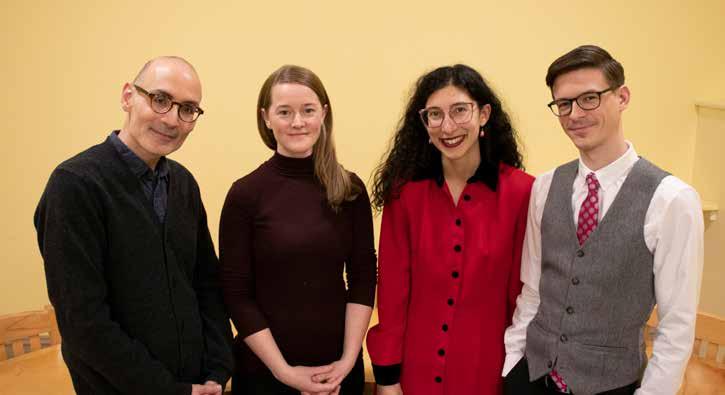
delighted to find that we are unanimous on this terribly important point.
FULLARTON: Thinking ahead to the next 50 years or so, but also for students now … I think it’s valuable to underscore the amount of responsibility that learning requires: I hope that students feel responsible for their learning in the sense [that] they’re not just passively there to receive knowledge, but that the work of trying to write on a text, trying to inhabit a text, all of that begins … in the first reading, and is enhanced in lecture and tutorial, but really, has to be ongoing.
… I think FYP is at its best when it encourages students [and] builds the confidence and courage to engage critically with a text. And I mean ‘critically’ in the sense of being able to listen to the text and to understand it, to hear it, without immediately getting defensive or resisting a reading of it.… What it means to develop this kind of critical relationship to ideas also involves being comfortable reading something without necessarily taking on its claims—not needing to find oneself in it to feel that a text or idea has value. And also recognizing that it might be difficult to get there the first time, but that there’s value in doing that work.
It is my hope and also expectation that FYP will continue to do those things and I can’t wait to see it, if I’m still here.


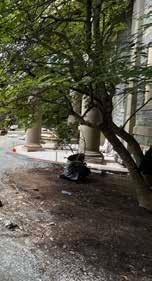
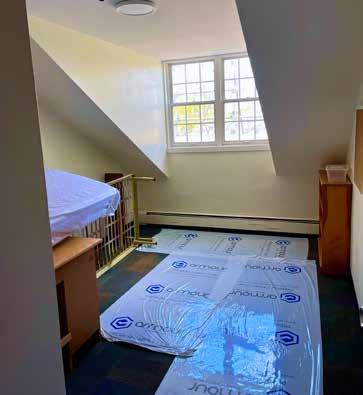
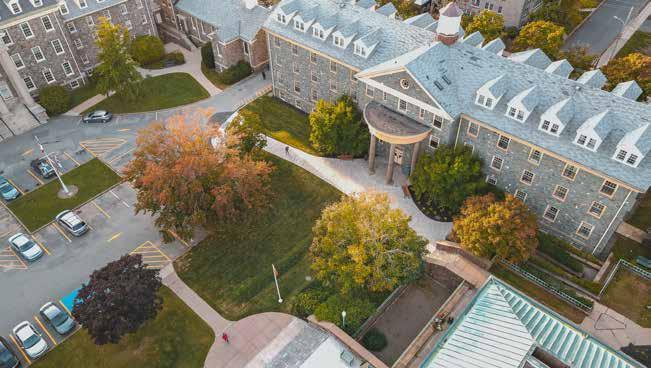

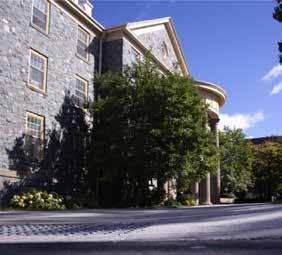
“The transformation of Alex Hall into a residence that any student can call home is an enhancement to our community that exceeds the sum of its parts. It is another big step in putting into action commitments we have made to reduce barriers—be they physical, cultural or socioeconomic—faced by some students who wish to come to King’s. And each time we reduce a barrier, our community grows in strength, vibrancy and inclusiveness.”
– President William LaheyAccessible bedroom The basement has been transformed with five accessible bedrooms and new accessible washrooms. The university hopes to introduce accessible bedrooms and washrooms on the first floor in the future. Elevator from hall The landing was converted into a new floor. A new, larger elevator runs from the basement through to the third floor. Renovated Alex Hall walkway Steps at the curb of the parking lot and at the residence’s entrance have been replaced by a sloped granite walkway.



